The Dream
East Glacier Park to Lincoln
June 22, 2009
The squall that hit yesterday afternoon, after I had reached town, amplified overnight and it was dumping rain when I awoke. Combined with the cold air of a Montana June, this was not a auspicious day for traveling. Rule #3 of long distance hiking is: "Only a great fool leaves a dry place." I slept in until 7:30, comfortable in the warm bunk bed. A little after 7 I slipped out of the dorm room, shirtless and sockless and glided into the kitchen to start coffee. I think the knowledge that I could get back into the warm bed made me relish the cold air on my skin. A few minutes after starting my first cup I looked up and saw Freefall standing in the hallway, wet, bedraggled, and looking very, very happy to be indoors. He and the others had been camped at Two Medicine and the rain had completely overwhelmed his non-seam sealed tarp. At one point, during the night, he had used his "water proof" trail map of the park as shelter. In the wee hours of the morning he called it good enough, packed, and road walked to East Glacier. I was very happy to see my friend safe.
Over the course of the morning and early afternoon hikers slowly rolled in, with horror stories, or glory stories depending on how perverse your point of view is, of the trek from Two Medicine to East Glacier. Some people came via the road, either walking the whole way or walking and hitching. Others, like SoFar, had taken the route over Scenic Point and encountered a much different place that I had. His video of the hike, complete with blowing snow, was something to be laughed at now that everyone was down and safe. We took over Brownies once again.
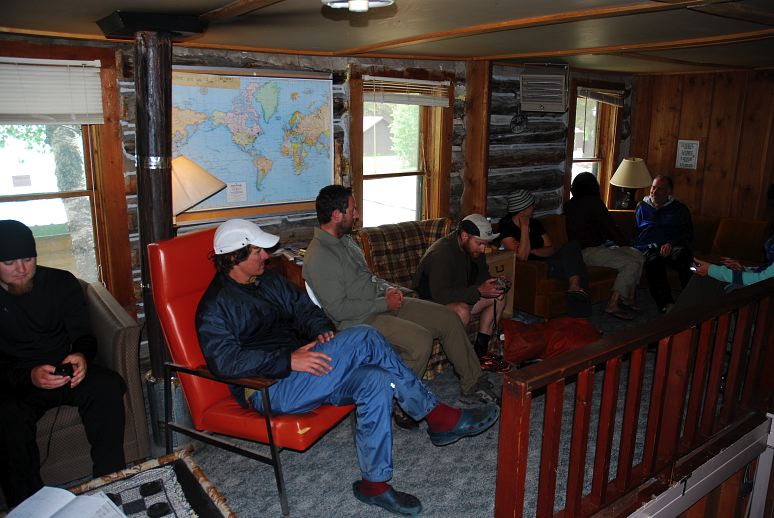
Having resupplied yesterday, i didn't have much to do, which makes for a perfect zero day. Town chores are boring to do and even more boring to read about. How entertaining is it to know that I ate a 12" pizza, or visited the post office? Or did laundry in the bath room? There were so many hikers in town that it was far more fun to spend time socializing than doing. Long distance hikers are just too much fun to be with. Take Chance, for example. Chance and I didn't meet on the PCT in 2003 when we both hiked it. We hiked together briefly in the summer of 2005 on a trek through the Washington Cascades. Chance has a really interesting set of ideas about nutrition for long distance hikers which, if it worked, would expand a hiker's range immensely. Rather than packing solid, standard hiker food, he was packing things like brewer's yeast, baker's chocolate, dried and powdered greens, peanuts, and other foods that he classified as "super". I use the quotes not derisively, but rather because I don't know what qualifies a food as a "superfood".
Below is Chance and his food supply for the 100 miles that he was planning to do to his next resupply point at Benchmark Ranch. In terms of bulk and weight, it represents about 2 days of my food supply. Granted, his caloric requirements are much lower, due to lower body weight, age, and a shorter distance covered each day, but if I was able to subsist effectively on that diet my hiking range would go up from about 250 miles to about 500 or even 700 miles between resupply points. It is unclear what the long term affects would be, but Chance seemed to be putting the diet to the acid test with his hike this summer.
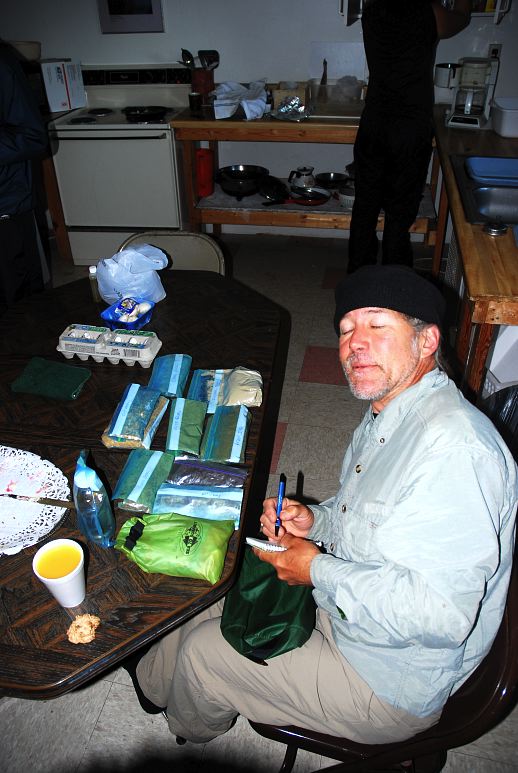
Most of the hikers were planning on leaving tomorrow, though I seemed to be the only one leaving in the morning. Most of the rest were going to wait around for postal packages, or to resupply, and wouldn't be leaving until the afternoon. I wanted to get into the wilderness to the south, to dive in deep, and revel in the beauty of our public land. I wanted to start moving south again, under my own schedule and in my own time. I was sad that I'd be leaving the others behind, for it was unlikely that they would catch up to me unless, as might happen, I returned to the CDT after a not-too-long hiatus. In front of me were probably five days without seeing another soul and crossing only one road. And then another couple of days into Lincoln. 175 miles of nearly unbroken wilderness. All the large predators were there, a sign of a heathy, preserved ecosystem. And I'd have it all to myself, if only for a little while.
Another cold morning. Another quiet creep to the kitchen without shoes or socks to make coffee. Another mellow start to the day. This would be my last chance to socialize with other thruhikers, perhaps for the rest of the summer. As sad as that was, I had other things that I wanted to do. I packed up and Duane and I headed over to the Two Medicine Grill, where we met Jym Beam and Rain Queen for breakfast. My future wife wasn't working, but made an appearance to talk to someone working behind the counter. She looked very fetching in her Carhartt jacket and work boots. Some day I'll propose.
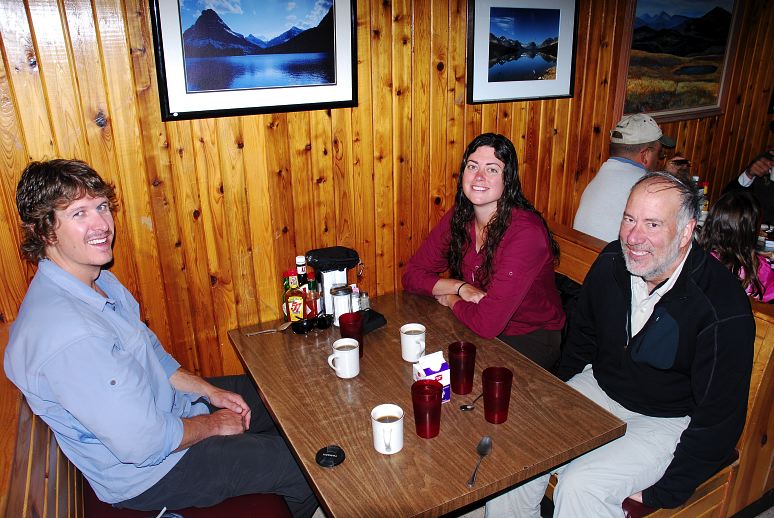
The four of us had made a nice team for the traverse through Glacier and it was the three of them that I'd miss the most. We had functioned smoothly together and that isn't an especially common thing amongst the traditionally introverted and unchained long distance hiking community. But Duane had his journey to make, as had Jym and Rain. I hoped I'd see them in the future. After a lingering breakfast it was time to go. I shouldered my pack and said my goodbyes and Duane walked me to the golf course, behind which the trail ran. The trail was more like an old jeep track that, while muddy with the recent rains, made for easy walking.
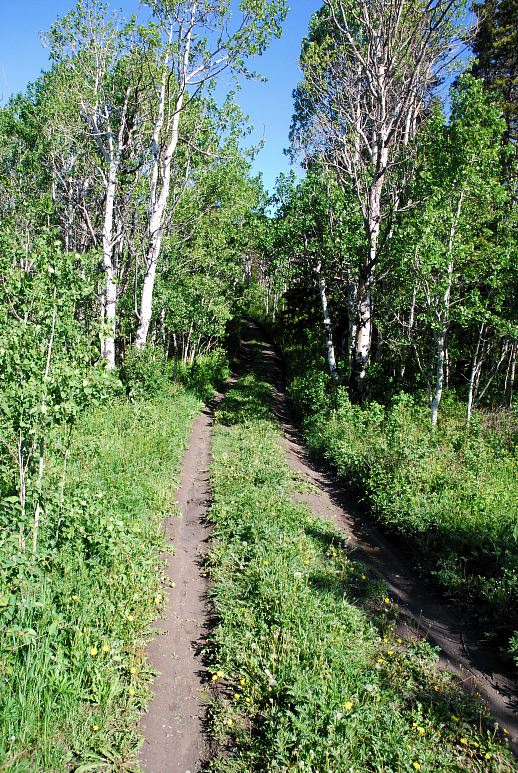
Almost immediately I picked up an escort of three Rez dogs, whom I quickly named Noser, Sen Dog, and Poochie, just so that I've had a name to use when I talked to them. Rez dogs are hierarchical, like all pack animals. But unlike indoor dogs, humans are outside the pack and so we get treated, for the most part, well by them.
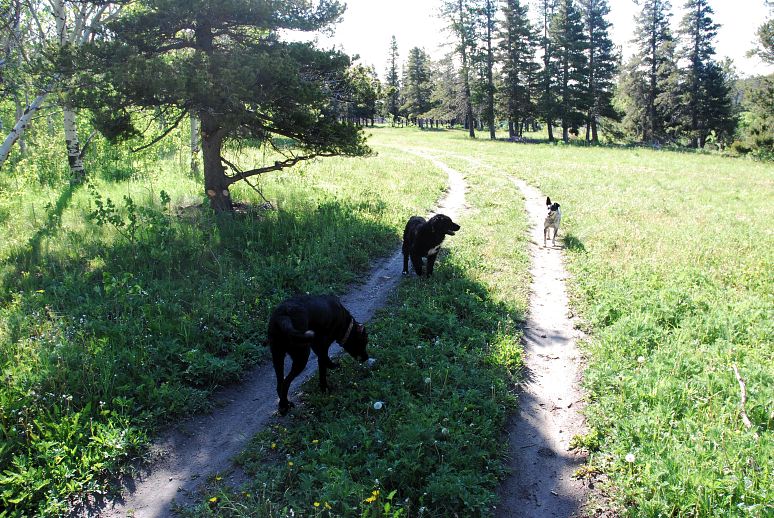
Here is Noser. You can see that he has a collar and a dog tag, which might make him an indoor dog also, or perhaps a former indoor dog. He seemed to especially enjoy getting into the big, muddy puddles of rain water.
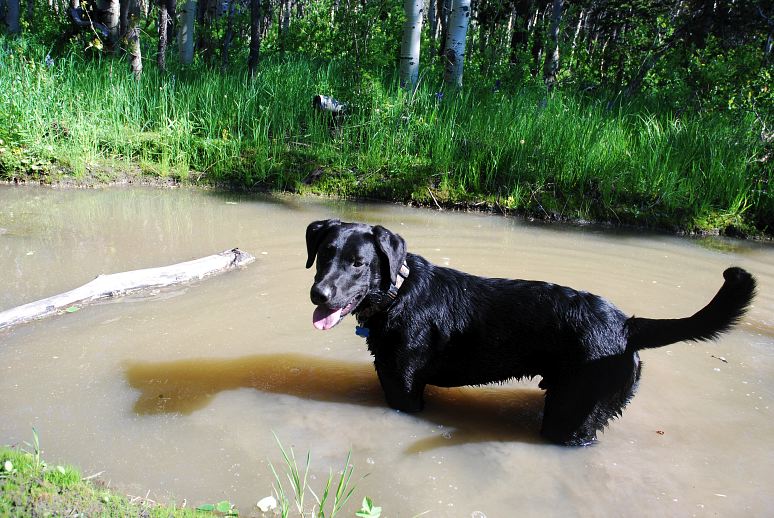
This is Sen Dog, named after a member of the mighty Cypress Hill, is seen below. I don't know why I named him Sen Dog, but maybe it was because of his half flopped ear and it's appeal to How I could just kill a man. Poochie is the black fuzz ball behind Sen Dog. Poochie was shy and never got close enough for me take a good picture of.
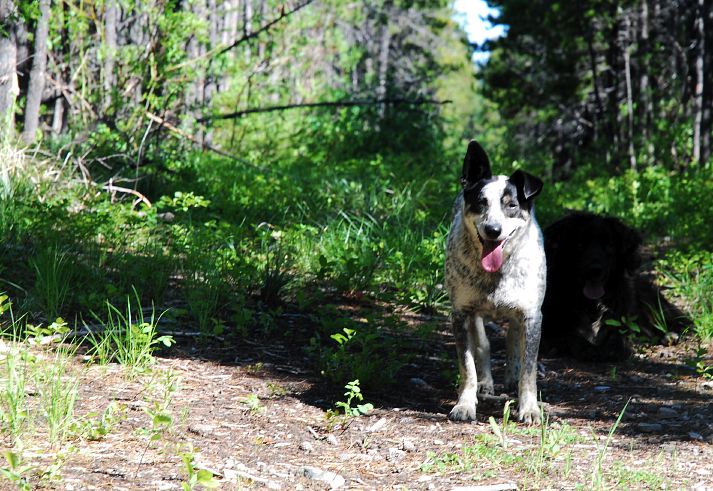
After thee and a half miles I reached the border with the park and took a rest. The sun was shining and my spirits were high, despite the fact that I was going to have to chase off my escort. As much as I like dogs, I didn't want to be responsible for anyone other than myself, at least for a little while.

I had hiked this stretch four years ago, but the difference between now and then was immense. Four years ago I could barely function. I couldn't think, I couldn't concentrate, and I couldn't focus on those things that make life so enjoyable. It was worse than a walking-dead feeling. The wilderness and the open spaces felt oppressive and served to bolster my isolation, rather than inspiring a more noble solitude. At every moment, four years ago, I wanted to be somewhere else. I had told someone, then, that dying doing something you loved was ok. What wasn't ok was dying in a car wreck on your way to your shit job at McDonalds. Four years ago, that was how I felt about the hike. I didn't want to do it anymore and was forcing things, which hurt even more.
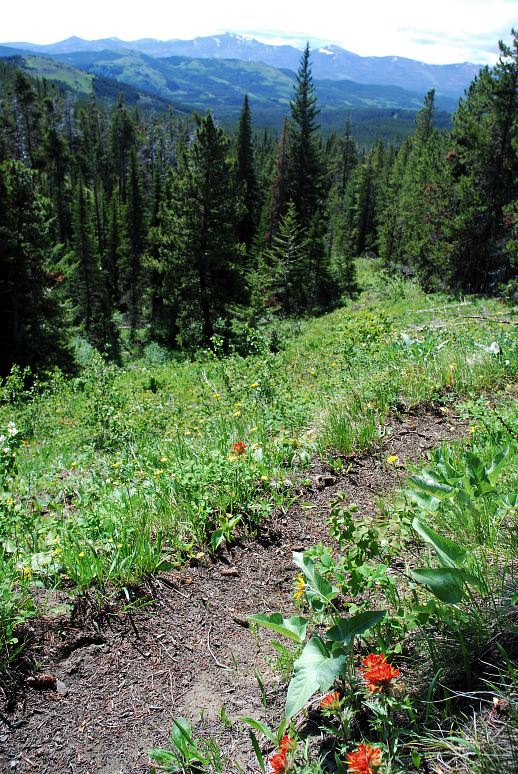
But now, today, I was in alignment with myself and was whole once more. I could do and think and act and be here, in this place, and be happy. Content. I didn't want to be anywhere else. I was looking forward to what was coming later in the day, tomorrow, next week. I was happy in the moment and that counted. I wandered down to Marias Pass, the lowest pass in the Rocky Mountains (about a vertical mile). Although most people, including locals, pronounce it like Mariah, the proper pronunciation should
Maria's: It was named for the Marias River, which was named Maria's by Meriwether Lewis for his cousin, who had the hots for.
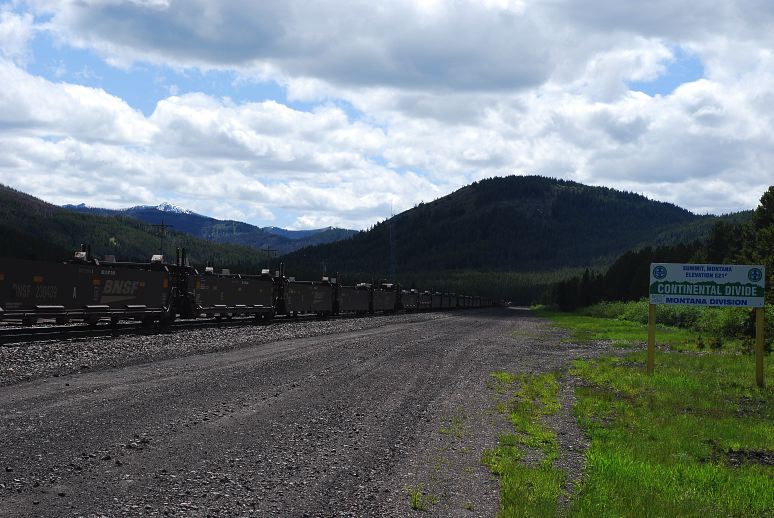
I walked across US2 and stopped at the monument on the far side. I wanted to relish the moment. I was going to start one of the great wilderness traverses in the lower 48. It wasn't just the activity that pleased my mind. It was the fact that every part of me wanted to be here and to do this thing. When you are perfectly aligned, doing an activity becomes effortless. It isn't so much that you are putting forth effort to accomplish something, but rather that your entire being is focused into a pinpoint of potential and all you have to do is let that potential out. To flow. I hiked up a muddy track and dropped a power line cut to the Sun River, which required a cold ford.
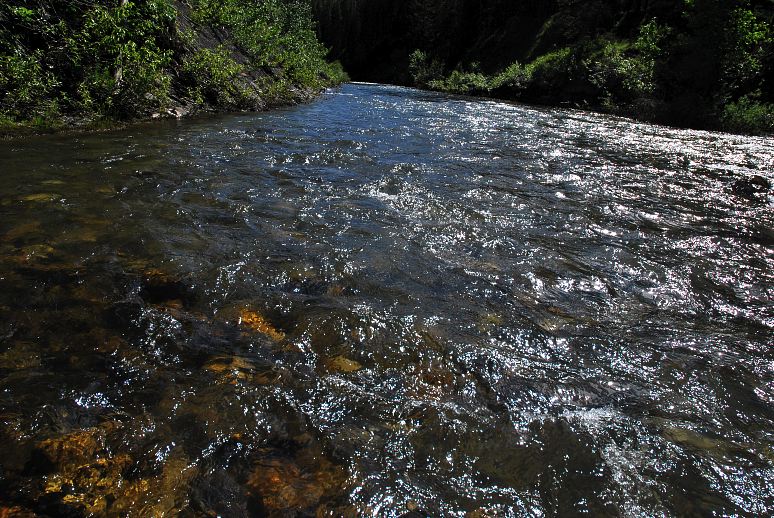
I hiked along the old jeep track, fording the river from time to time, and was overjoyed at watching the rapid increase in the number of bear tracks and scat as I moved away from the road and civilization. A place can be called wild only if it has the power to kill you. The desert can kill with its heat and sun. The arctic can kill you with its cold. Montana could kill me with its bears, though this was an unlikely thing to happen. I stopped for a hot dinner along the banks of the river, laying in the sun while the water boiled for my dinner of turkey stuffing with olive oil. I had no intention of cooking anywhere near my camping area until I got south of Helena and away from grizzly bears. I hiked for another hour to Whiterock Creek camp and here set up camp, exactly where I had four years ago, though on the other side of the track.
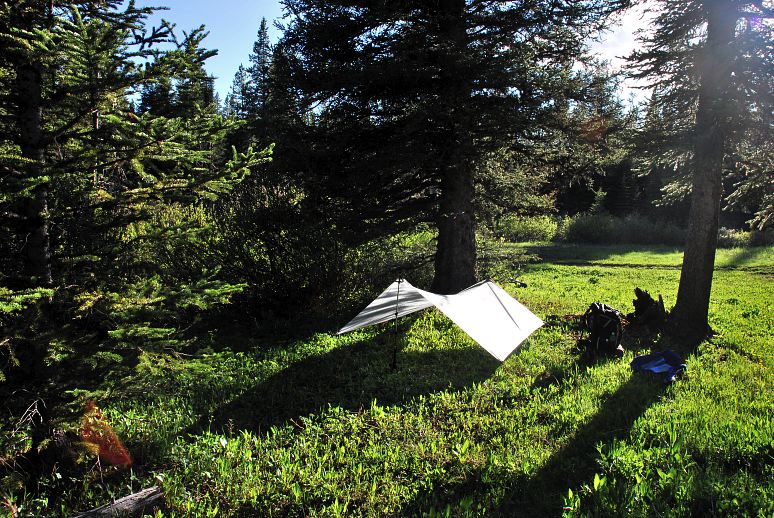
After throwing a bear line for my food and getting my tarp up, I went to fetch water from the creek and found an enormous bear track in the mud. My shoe size, by the way is 15.
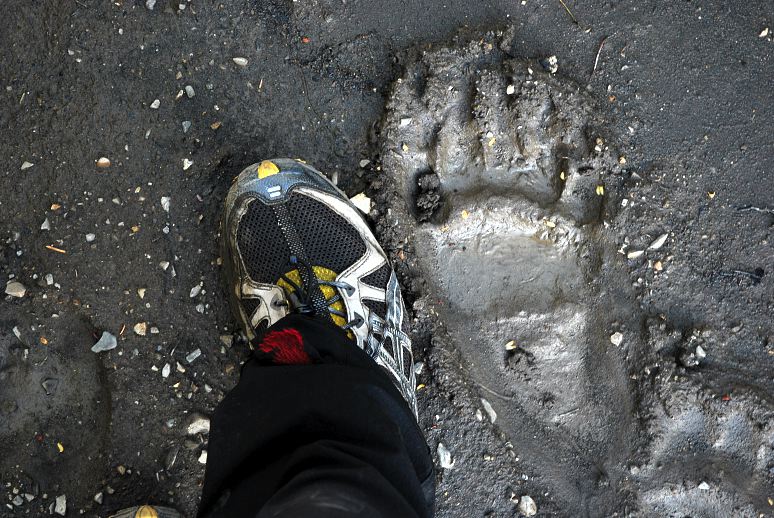
I'm 6'4" and do not have dainty hands. There was a large bear frequenting this area, but hopefully it wouldn't come too close to my camp. I settled in under my tarp for the night, smiling broadly. It is easy to be happy when everything around you is perfect.
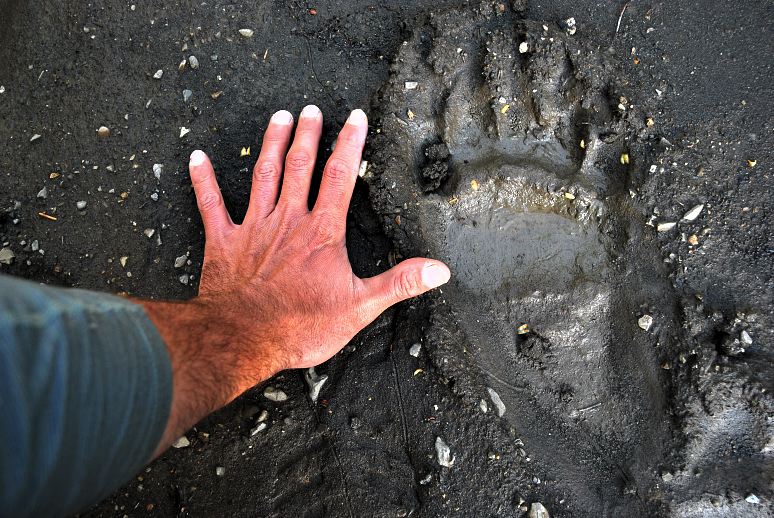
I'd rather wake up in the middle of nowhere than in any city on earth. I think Steve McQueen said that, which sounds pretty funny coming from a Hollywood superstar, but its goddamn right. It was cold outside of my sleeping bag and I relished the contrast of my warm body and my frosty nose. I lay still for as long as I could, then made a dash for my food, a hundred yards away hanging in a tree. I needed some morning tea, after all.
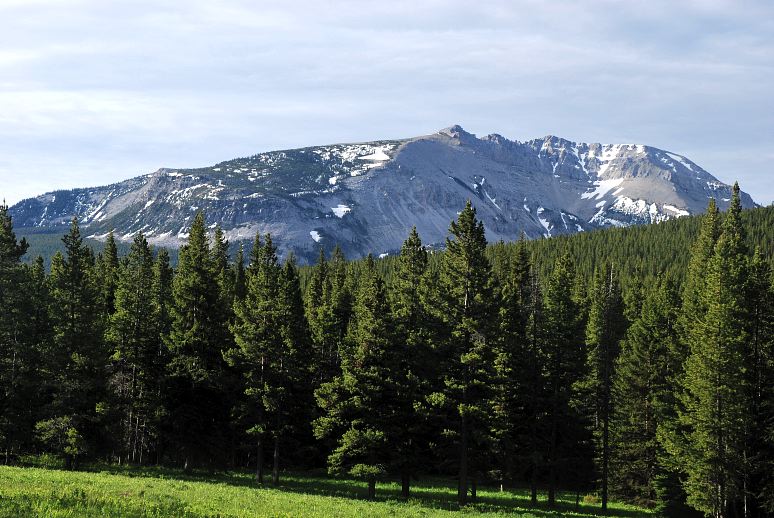
Once I was dressed and packed and moving, the weather was truly glorious. The skies were a pale, cloudless blue and the cold air seemed, improbably enough, to bring forth new smells from the forest and open plains, dotted with young wildflowers, that I was traversing. Rimming the valley were the usual mountains, craggy with snow filled gullies, but not my destination. There would be time aplenty to be up high.
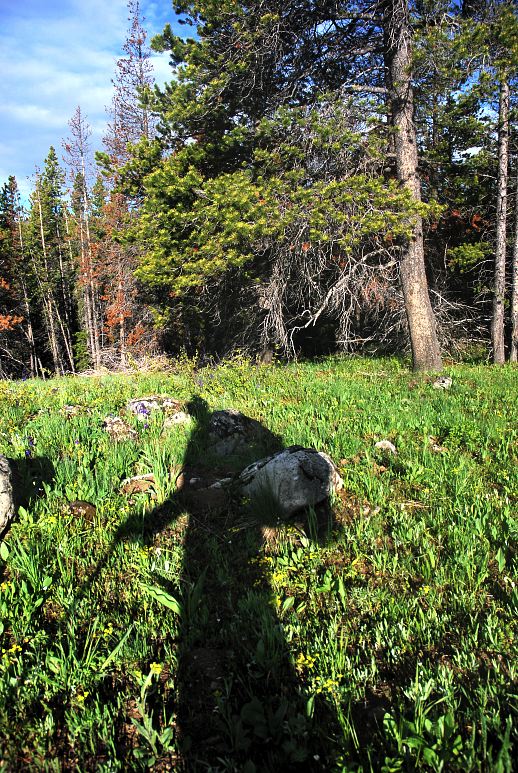
There is something about the beginning of a day in the wilds that is so special. The entire day sits before you, stretching out like an impossible dream that a child might have. The world is endless, the possibilities vast, and only you have control over what happens in your dream world. At least it's like that when the weather is good. When the weather is shite, you run and hide and do your best to survive.
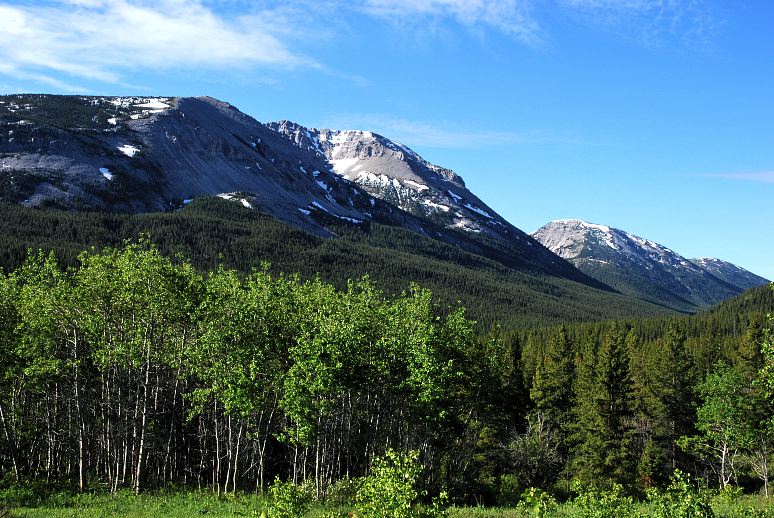
Unfortunately the quality trail rapidly began to degrade as the day wore on. As I climbed toward Muskrat Pass, a wooded, viewless afair, the trail became more and more chewed up by horsepackers. Combined with melting snow, the muddy, mucky track became more chore than pleasure and near the top my serenity was gone, replaced with a revulsion for equestrians that went to a genetic level.
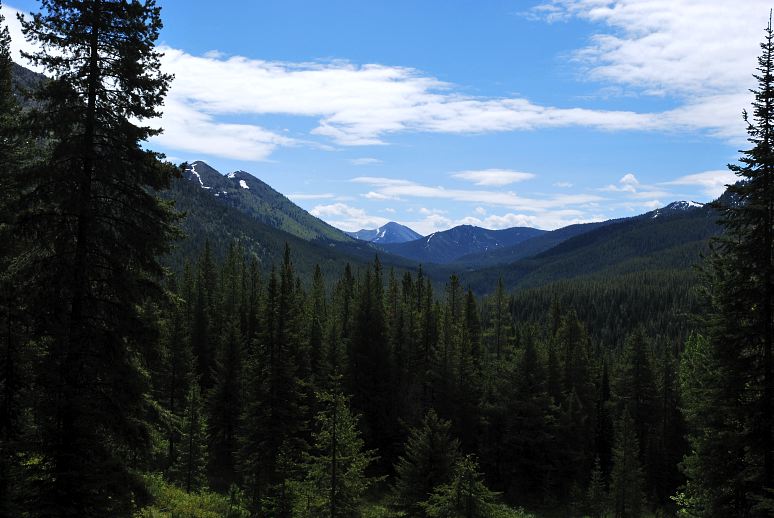
Climbing through a small plateau, I entered the Bob Marshall Wilderness. The Bob, as it's known, is one of the largest intact wilderness complexes in the United States. When connected with the adjacent Scapegoat and Great Bear Wildernesses, there is an immense, mostly roadless wilderness that should be recognized as a national treasure. Amongst locals and a few hikers and hunters in the know, it is. But for the majority of Americans it is just a large spot on the map that they have to drive around because those God Damned Democrats won't put a road where people want to drive.
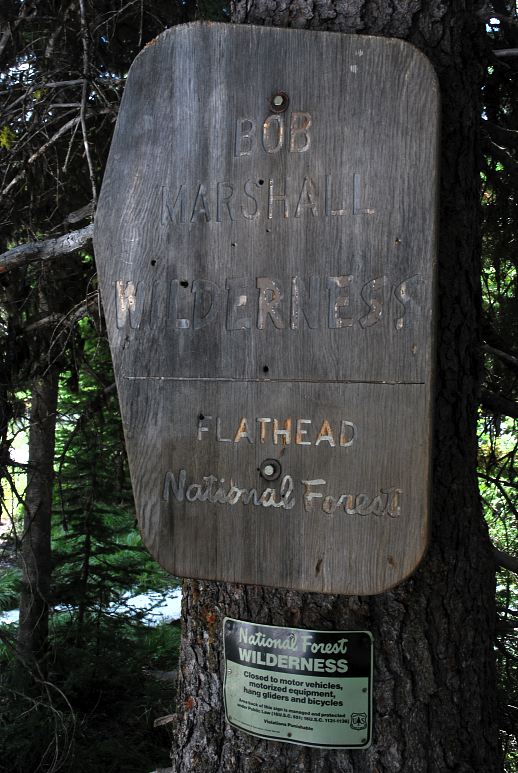
I climbed up and over Beaver Pass and the trail immediately got better. It was still spring up here and I had been traversing patchy snow for some time. After Beaver Pass the snow went away, but the coloration of the shrubs was still a golden autumnal shade, with wildflowers beginning their bloom. It was the time of rebirth in the mountains of northern Montana, and it was a great time to be out here.
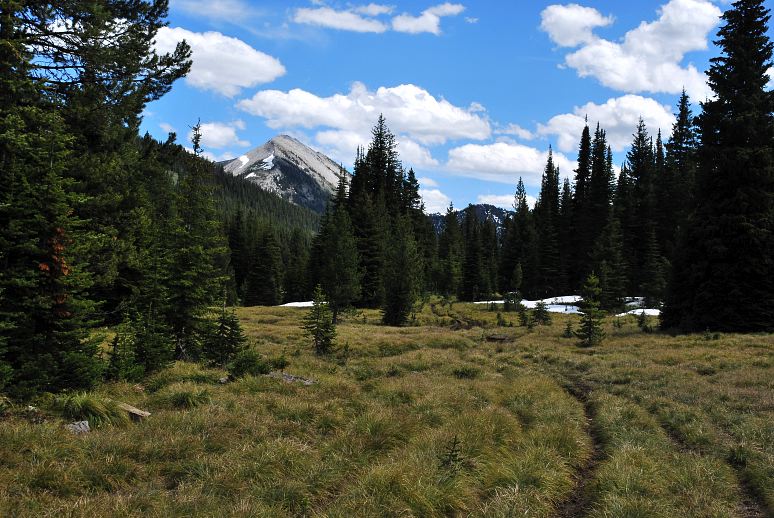
I reached Strawberry Creek and began descending along its banks, stopping at 3:30 for a much deserved dinner. I had begun to tire, but forty five minutes along its banks and a potful of hot mashed potatoes revived me. I could have camped where I was. Or up at the plateau. The time I had out here was mine, and not subject to the artifices of obligations of settled life. I chose to walk on.
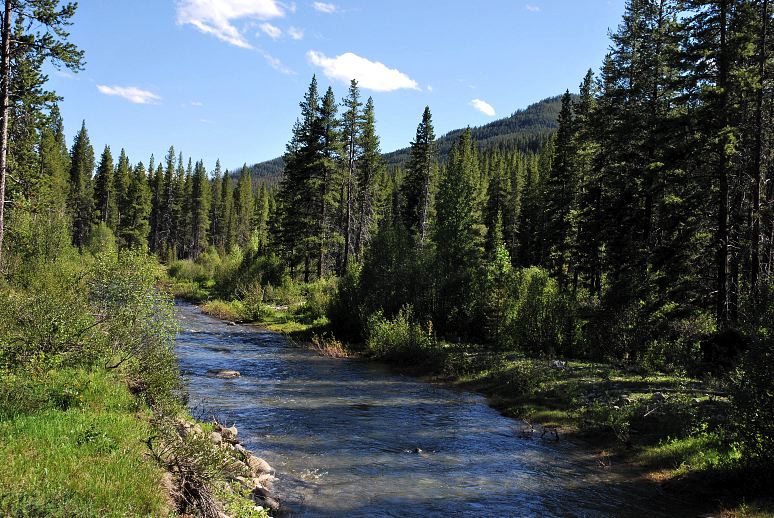
The descent brought me to a burn area that had not existed four years ago. While the trail through it had been recut, much of the topography had changed. Although I loathed the horsemen for the impact that they had on trails, it was also true that the trail had almost certainly been recut by horsemen. Horsepackers are amongst the best of trail maintainers precisely because they need cleared trails to do their thing. Yeast may give women infections, but it also makes beer.

My hoped for campsite no longer existed and I had to hike three miles further than I had hoped to get clear of downfall and widowmakers before I could find an acceptable campsite along the shores of Gooseberry Creek. I was tired and the sun was getting ready to fade by the time I got my tarp up and my food hung. I had hiked nearly 30 miles today the body was not terribly happy with that, especially since I had a hard day coming up tomorrow. The snow was definitely deeper than in 2004 and I knew that what I had coming up would be hard. Switchback Pass would be buried in snow, as would the approach to it via Dean Lake. But it would be my day, all mine.
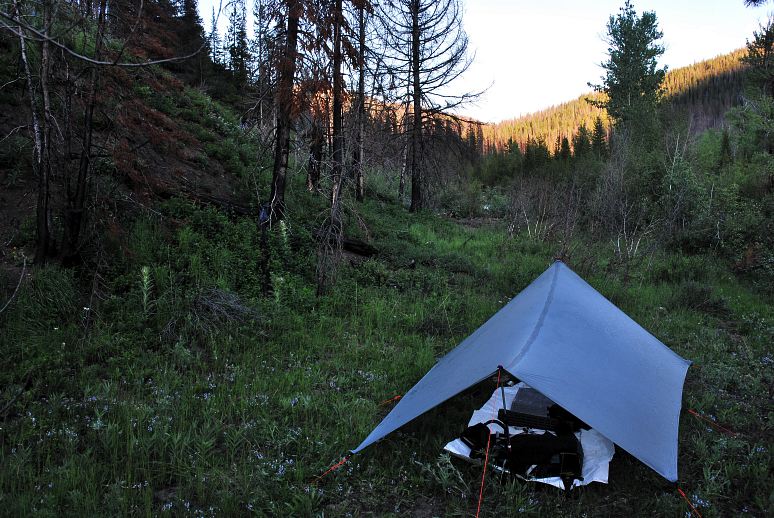
I opened my eyes to blackness and listened to the sound. Looking through one end of the tarp I could see only the brilliant stars, unpolluted by city lights. But there was the sound. It was raining on me, and quite heavily. But there were the stars nonetheless. I watched the strange phenomenon for a while, there in the dark, until the rain cloud passed overhead and blotted the pinpricks of light out of existence, at least for a while. I slept deeply once again and didn't get going until nearly 8 am.
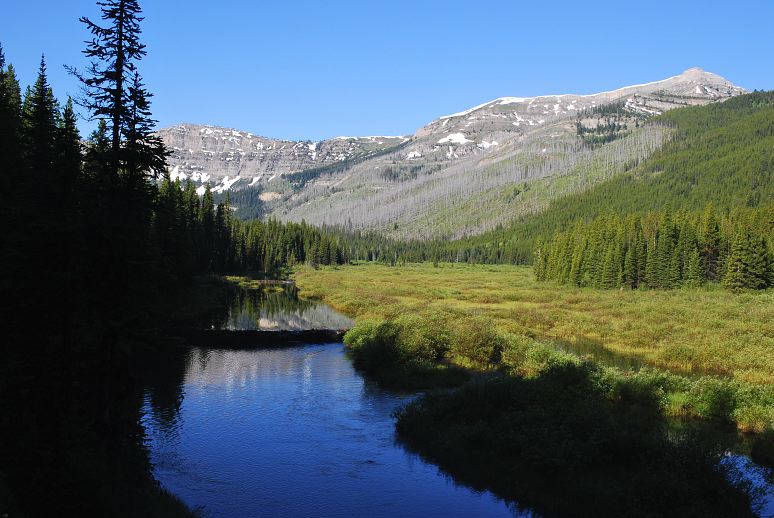
It was a short hike the a forest ranger cabin at Gooseberry Park, which was locked up tight. I had camped on its porch four years ago and spent an unpleasant night battling a rodent that was intent on eating my pack straps for the salt they held. I kept trying to discourage it gently, but it wouldn't give up. So I whacked it with my ice axe and it either died or went away, for it never came back. There was a double ford of the creek to negotiate, but despite the snow melt the ford was very reasonable and I got to the other side safely and was off and running.
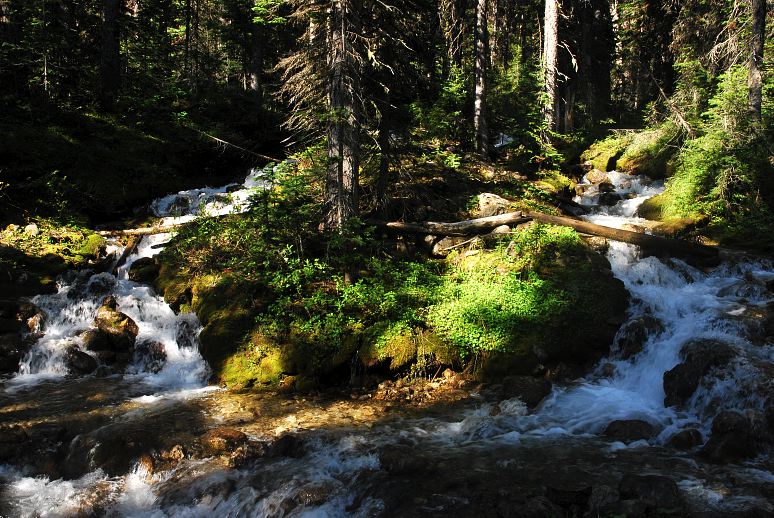
The trail led me through the woods where I encountered part of the head and the lower hindquarters of a fawn, probably the result of a bear kill. I didn't linger. There was much water crossing the trail and at some points the snow melt completely submerged the trail to a depth of two feet, forcing a long, cold wade upon me. But eventually I began to climb steadily through the trees and eventually onto the plateau above, which I knew rose to hit Dean Lake, my first target for the day.
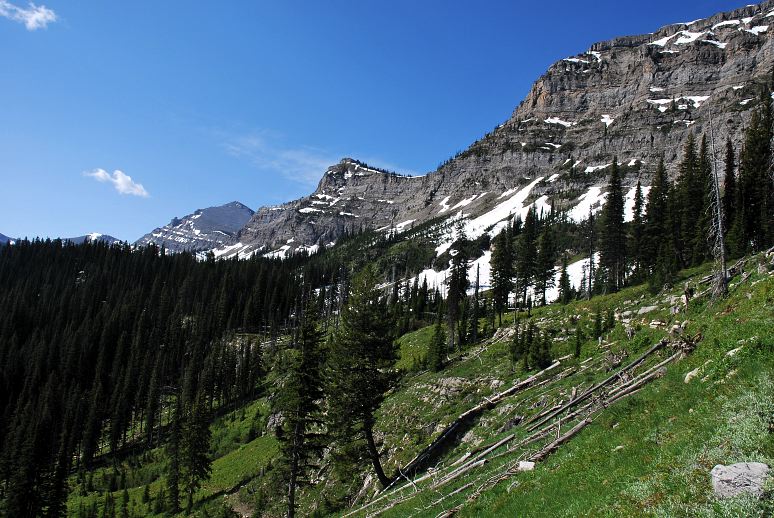
The plateau was gorgeous, but had a nasty side to its beauty. I had a quarter mile of easy, wildflower strewn travel before the snow came back completely. The snow quickly became rotten and I postholed repeatedly as I followed what I hoped was the right direction. Navigation was easy enough, for I had a large escarpment on the right to follow. However, the snow made travel very tiring and avalanche debris were extensive, forcing odd routes and difficult bushwhacks on me.
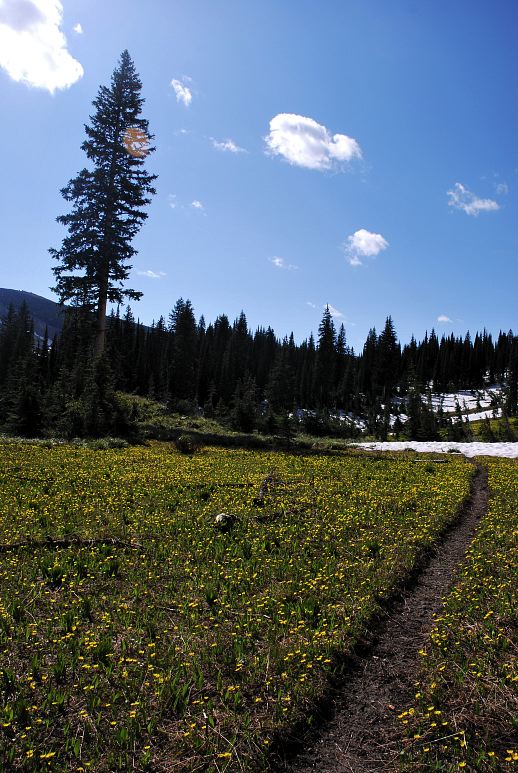
It took a long time to go a short distance and I was very tired when I reached, almost perfectly, the rim above Dean Lake. I was too tired to go down to the lake, and instead stayed at my perch, enjoying the view down a new valley. You can see part of my route In the below photo: I need to drop down onto the snow, then head up the small, snowy valley on the extreme right of the photo, which leads, after a snow climb, to Switchback Pass. The main, central valley is not the one that I came up. Rather, the route to Dean Lake is out of the photo to the left, on the other side of the valley wall.

After a much needed rest, some food, and some water, I started down the descent for the valley below me, trying to stay on good snow as much as possible. The snow was rotten, but occasionally I'd be able to stay afloat. Some simple like that, just an easy step or two, seemed like the best thing in the world, like a little extra butter on your popcorn at the movies, not that I ever go to the movies or eat popcorn. I slogged up the valley, following the best track I could, then climbed steeply up the snow toward where I knew Switchback Pass was. In 2005 I was anxious, because you can't see the pass until you're nearly on top of it. Today I climbed calmly to the top and rested in the blowing wind.
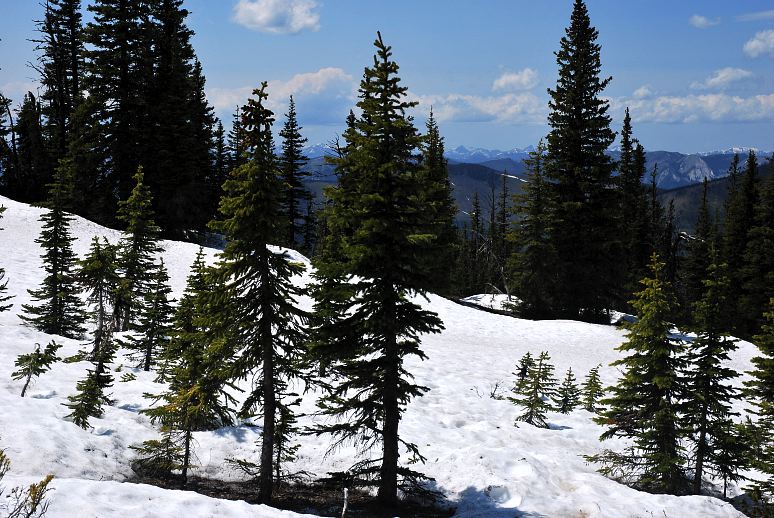
I hadn't brought enough water up from the valley and as a result I was parched despite downing the entire liter I was carrying. It was 1:30 and I had been working extremely hard for not very many miles. The descent looked not so pleasant, with complete snow coverage and no tracks. Climbing to a pass is normally easy, but descending requires that you hit a very small target, namely the trail. I turned on the GPS for the first time in the trip (previously Duane had used his) and tried to follow it and the trail as best as I could.
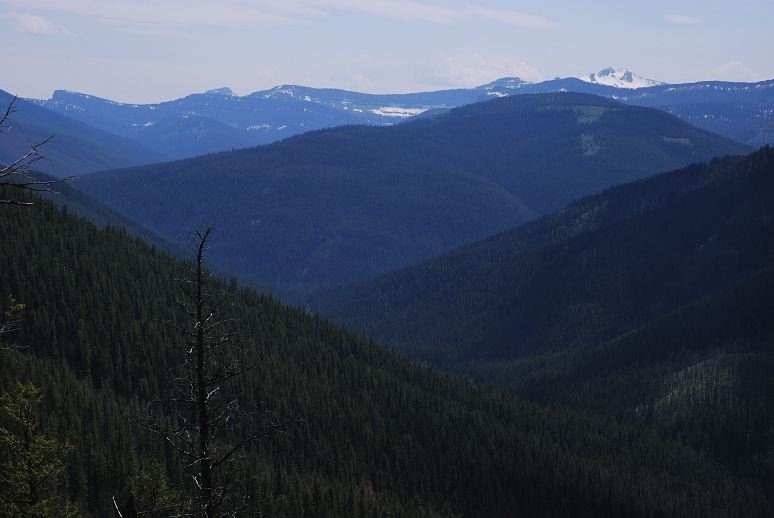
After 30 frustrating minutes I finally cut the trail and was able to move efficiently once again, perhaps for the first time the entire day. The trail dropped and dropped and dropped, but intersected no water for almost another hour. An hour of thirst isn't pleasant and so it was with great delight that I hit a small creek and filled my water bottle with cold, pure snowmelt. The remainder of the hike down to the valley floor was uneventful, relaxing, and peaceful after the exertions of the morning and early afternoon. I stopped at Pentagon Guard Station, also uninhabited, for dinner and to dry out my tarp from last night's rain. I realized that I hadn't seen anyone since leaving Marias Pass.
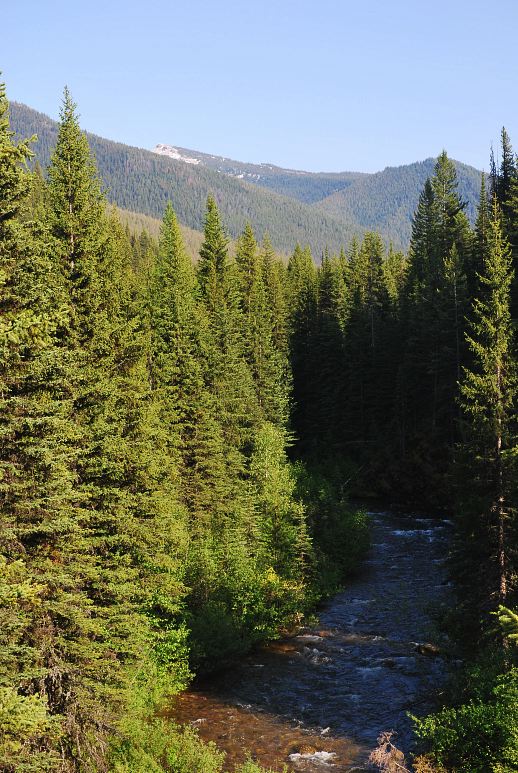
A short ford brought me over to the right side of the Spotted Bear river and I began the ascent of that river system. The route through the Bob was one of long valleys, plateaus, and a few passes in between. The Spotted Bear would rise to Spotted Bear Pass, from which I'd traverse over to a plateau holding the Chinese Wall, a long rock formation that I well remembered from four years ago. Then I had compared it to the Grand Canyon, much to its detriment. Maybe this time would be better. I hiked for a little over an hour to a track leading down to the river, where a hunter or horsepacker camp was located. Soft, open grass with just enough tree cover to keep the condensation off of me. Perfect. Sometimes it amazes me at how little we really need to survive. I had a roof over my head that would do just fine except in the absolute worst of storms. I had warm, if not clean, clothes. I had food and water and a safe place to spend the night. I had a classic piece of American history to read. I would eventually need human companionship, but for now I couldn't imagine being in a better place.
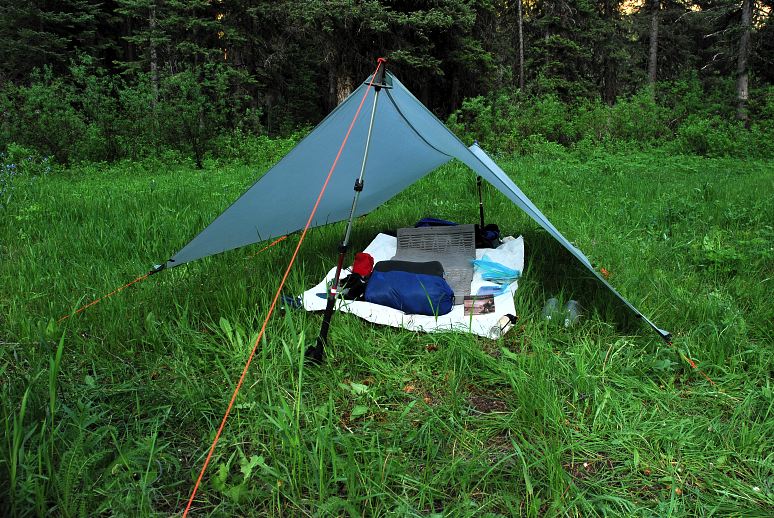
It was quite cold overnight and I could see the pale white of frost on my grey tarp overhead. I shut my eyes and dozed a while longer. To even start the day I had to get out of my little cocoon of warmth and make a dash to my food, swinging in a tree thirty yards away. It was a bracing morning. The hike up toward Spotted Bear pass was easy, but the last four miles proved to be very brushy, a sure sign of the trail's disuse among backcountry horsemen. It wasn't unpleasant, but if it was raining it would have been awful. I started hitting snow at the pass and then climbed through patches of it to near My Lake, which was completely buried in snow, with only a few thawed patches.
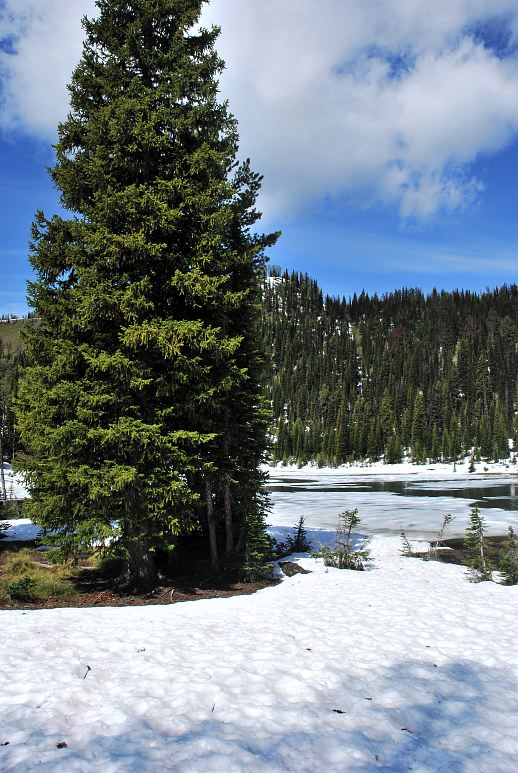
Four years ago I had been suffering greatly and it was with great relief that I met Buck 30 and Lisa here at the lake. We hiked the rest of the day together and a bit of the next before they turned off for a resupply in Augusta. I remember that time well, for it was 24 hours when I didn't hurt inside and could enjoy the world around me instead of cursing its existence. Using my map, eyes, compass, and GPS, I navigated through the snowy woods, taking advantage of the still firm snow. It was slow going, but not difficult. Lots of avalanche debris forced a circuitous route on me and I was quite happy to come around the corner near Larch Hill Pass and get my first view of the Chinese Wall.
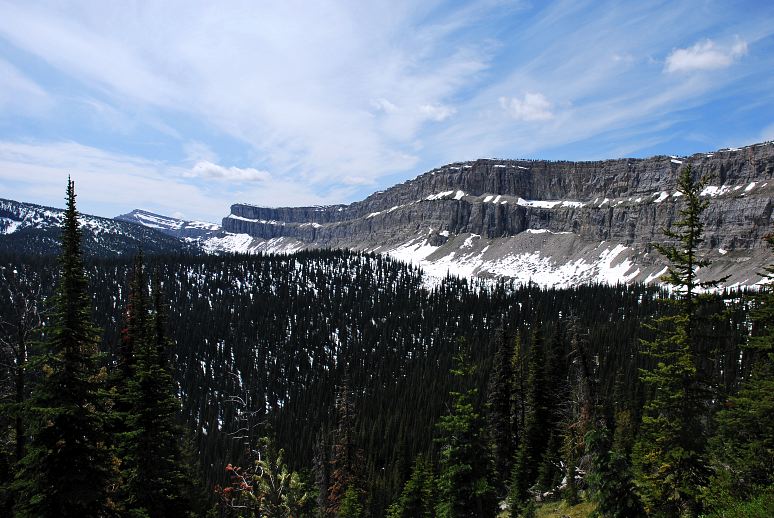
Although the Wall is pretty in its own right, I despaired at all the snow that I saw. Soon the sun will have weakened it and the traverse of the Wall was going to take a very long time. The Wall is an amazing rock formation for the northern Rockies. It wouldn't rate very high, though, in Utah or Arizona, places I've spent a fair amount of time in. I'm a scenery snob, and only the best will do.

The trail, remarkably, was snow free to Larch Hill Pass and I enjoyed quarter mile or so of snow free hiking along the base of the Wall. In 2005 this was completely bare, with no snow whatsoever, just a lot of mud and horse chewed trails. The snow quickly came back and I was back to postholing. Navigation, fortunately, was simple: Just keep the Wall on your right and shoot for the low passes.
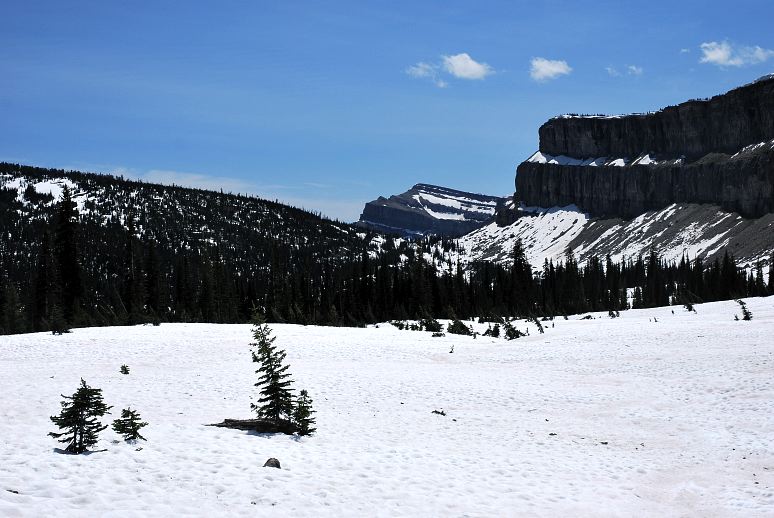
The first pass went easily, with standard snow walking and no sharp inclines. I dropped down the other side and traversed along the open plateau. The sun cupped snow forced my attention on my feet and my balance, rather than having a wandering mind and lingering eyes. At the second pass I decided to forgo the hypothetical trail, which dropped down into a ravine and then climbed and traversed a wooded hillside, show in the left most portion of the below photo. I knew the trail was over there from past experience and from being able to see bits and pieces of it where the snow had let go its grip. Instead, I traversed to the right through the boulder fields you can see. Not clever and I arrived at the top of the pass very tired.
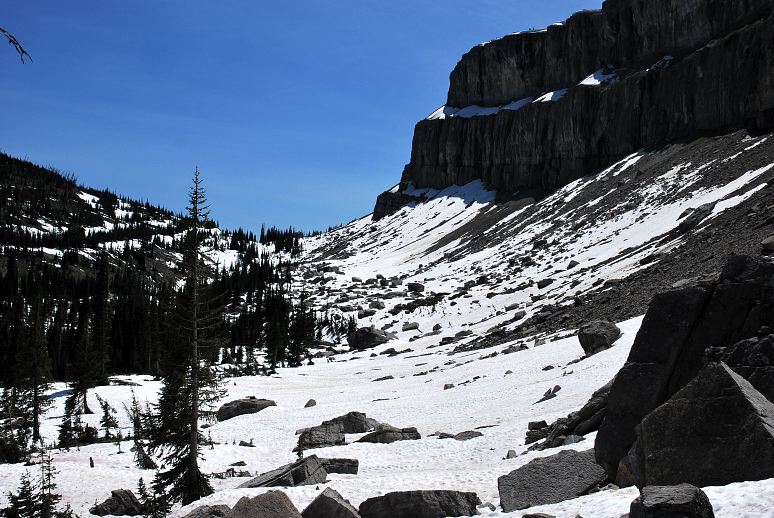
I rested on a boulder at the top and looked out over what was left. Less snow here, for sure, but plenty of water. Navigation was again simple: Aim for the pass on the far end of the plateau, trying to pick up trail when you can. I was still pre-occupied with my feet and not falling over or breaking an ankle in a posthole, which meant for some dreary hiking at times, despite the fabulous beauty on display.
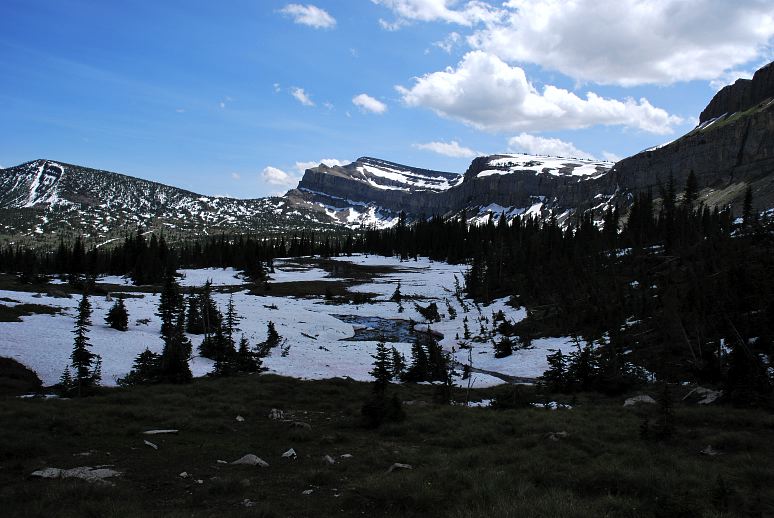
I dropped down and picked my way through the patchy snow, thankful for some easy walking again. The climb to the last pass was tiring due only to the low amount of food and water I had consumed during the day. Nevertheless, I managed to let loose a war whoop on top, thinking of my friend Will and his screams of joy whenever he'd top out on a Sierran pass. The Wall continued on for a while, but the trail dropped into the valley below, heading for the Sun river and, eventually, the only road to enter the wilderness at Benchmark Ranch.
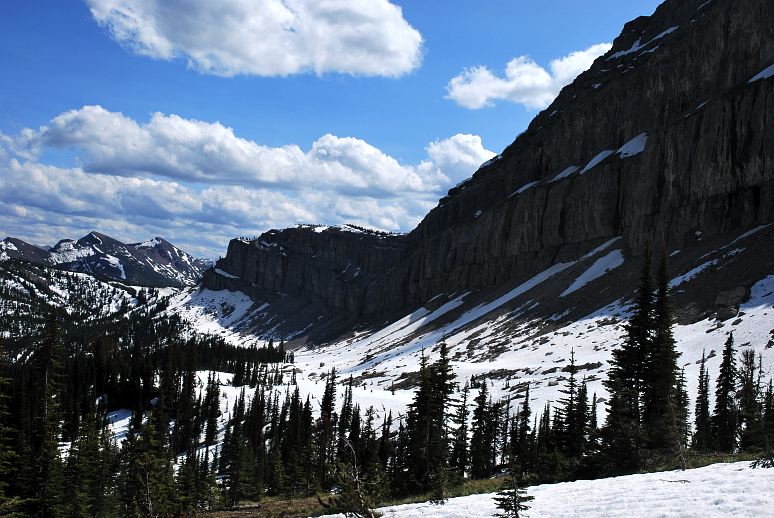
I stopped at a gushing snowmelt creek at 4:30 for dinner. I had expended a lot of calories and lost a lot of salt in the process of hiking through the snow and needed some fat and salt. A pot of a Lipton's Rice and Sauce (actually, know Knorr, but everyone still calls it Liptons) with a heavy dose of olive oil did the trick. As I sat eating my fare, I realized that, unlike most long distance trips, I hadn't really had any long, engaged thinking sessions. Rather than pondering and thinking and surmising and philosophizing and conjecturing and arguing and contrasting, rather than doing all these mental activities that are so enhanced by the natural world, rather than doing these things, I had scarcely had a thought in my head for these first twelve days of the trip.
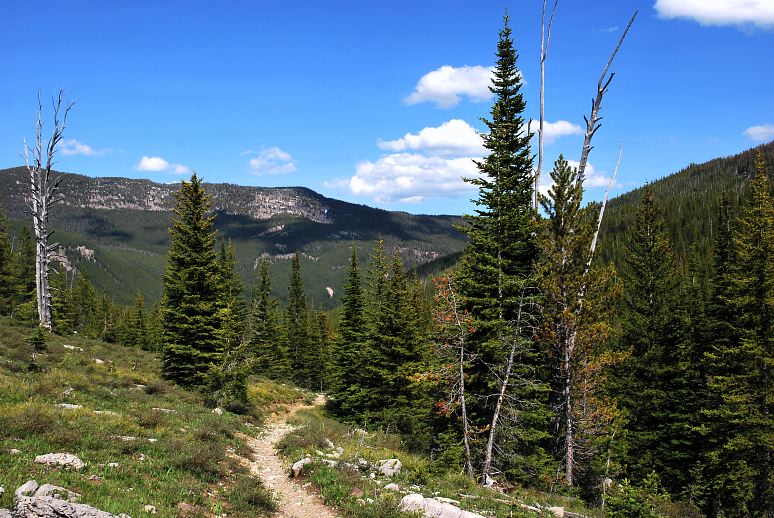
It wasn't that I was bored. I think it was because I felt like I was at home, rather than some place exotic or different. I was so comfortable out here in the wilds of northern Montana that I could simply be. Not be something. But be.
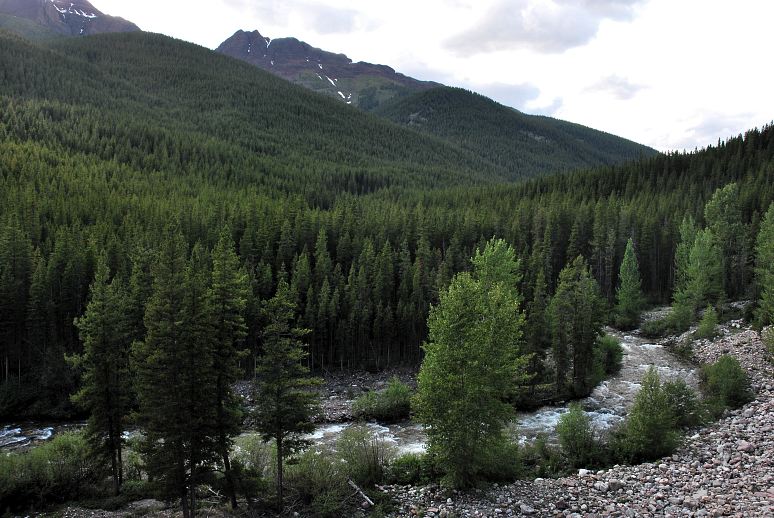
I rambled down to the Sun River, passing yet another uninhabited guard station, and rolled along open plain. A clump of trees unburnt by a recent fire, beckoned. Inside of their protection branches I found a marvelous campsite. Decade upon decade of pine needle and duff coated the floor, making a sleeping pad almost superfluous. The smell in the air was intoxicating. I quickly set up my tarp. This was home. This was comfort and security and perfection all in one. This was where everything was clear and uncomplicated. Being at home somewhere is what everyone truly strives for, whether consciously or unconsciously. It is our goal, it seems, as humans. We are looking for home, always.

The wind blew and blew last night, but my trees protected my camp and I awoke to blue skies and still air. It was a gorgeous morning and not nearly as cold as the previous few, which made getting started a lot easier. I sat under my tarp, drinking tea and looking at maps, trying to figure out the best place to camp tonight in order to make tomorrow easier. Tomorrow would be the long, exposed ridge route through the Scapegoat. Water would dictate camping tomorrow. I set out along the trail, hiking above the Sun river in glorious conditions. it was hard not to be fully encapsulated in your surroundings when things were this beautiful.
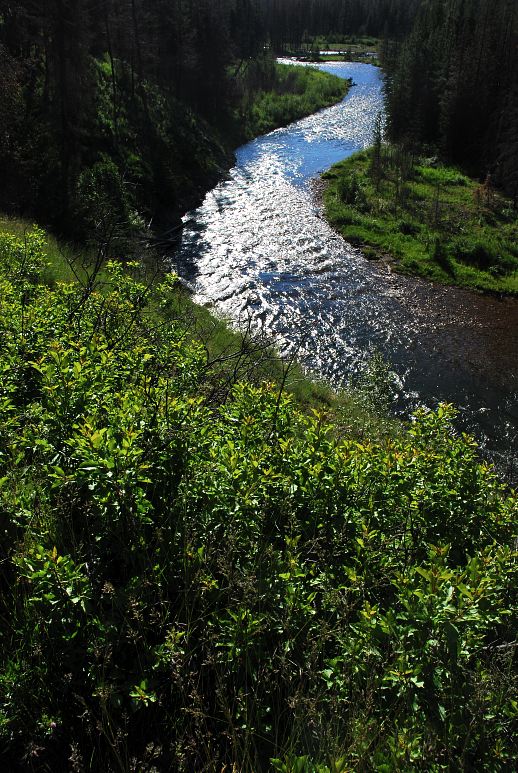
I dropped down and crossed the Sun on a large bridge, stopping for a rest and to rinse out my socks. After a brief climb I started down a gentle decline toward the road to Benchmark Ranch and Augusta, MT, meeting my first humans in almost 5 days. It is a Saturday, after all. The Benchmark trailhead had numerous RVs, trailers, campers, and horses, which was to be expected in Montana on a fine weather weekend. But it was somehow off-putting. Like the road at Many Glacier, I just didn't want them here, even though the frontcountry was more their home than mine. I hiked quickly past them and picked up Straight Creek. It only took a quarter mile of hiking to get away from the front country and I found a pleasantly shady spot to rest and eat lunch. I had left the Bob and was now in the Scapegoat Wilderness, another fine stretch of land protected from development.
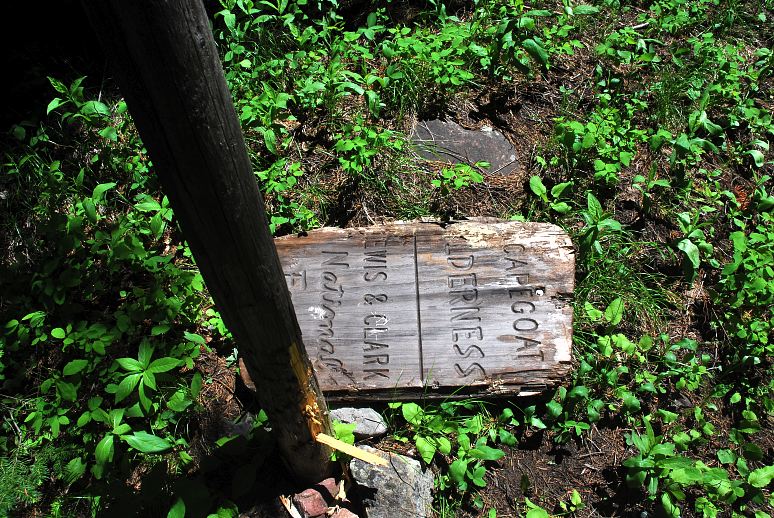
The Straight Creek area had been burned in a horrendous fire in 1988. This was the same year as the disastrous fire in Yellowstone that scarred so much of that park. One result of the fire was that there was very little tree cover along Straight Creek, which meant little shade and higher temperatures in the afternoon. I slogged up the valley, stopping for water from time to time from little side streams, and tried not to focus on logging miles and logistical issues.
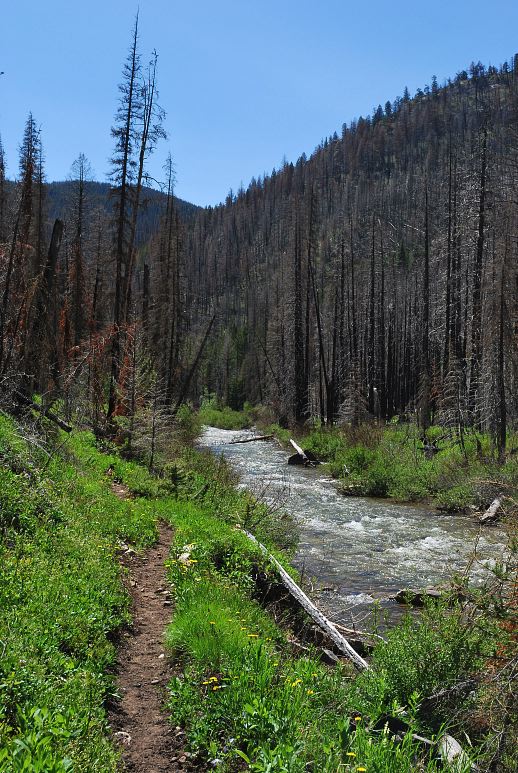
The trail began to climb in earnest at the head of the valley and ran me up and along the flanks of the mountains forming Straight Creek Pass. The lack of trees and shade immediately brought memories of Southern California to my mind. With the memories the logistical thoughts faded and I returned once again to the here-and-now, rather than what might be tomorrow. As much as I try, that is something that gives me difficulty on a day-to-day basis.
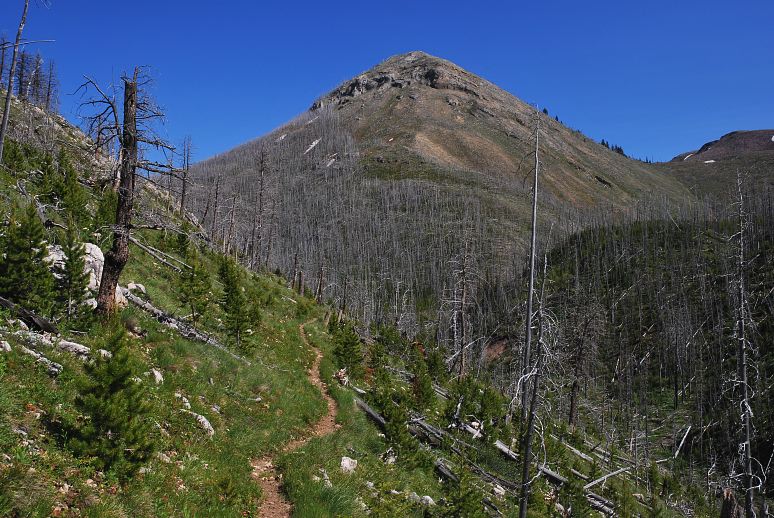
I find myself, when back in settled society, falling into the trap of thinking about what I will do, rather than doing well what ever is at my hands right now. By letting tomorrow, or the next day, dominate your thoughts, the present gets lost. For most people, the future they truly want never actually arrives, and their stuck with the future that they were actually working toward. Hesse wrote about this in Steppenwolfe, about a man who got what he actually sought for, but which wasn't what he actually wanted. When I first read the book I didn't really pick that up: All his life he had been striving to have people leave him alone with his thoughts and his work. Eventually he realized that this was exactly what had happened, and he all the more poor because of it.
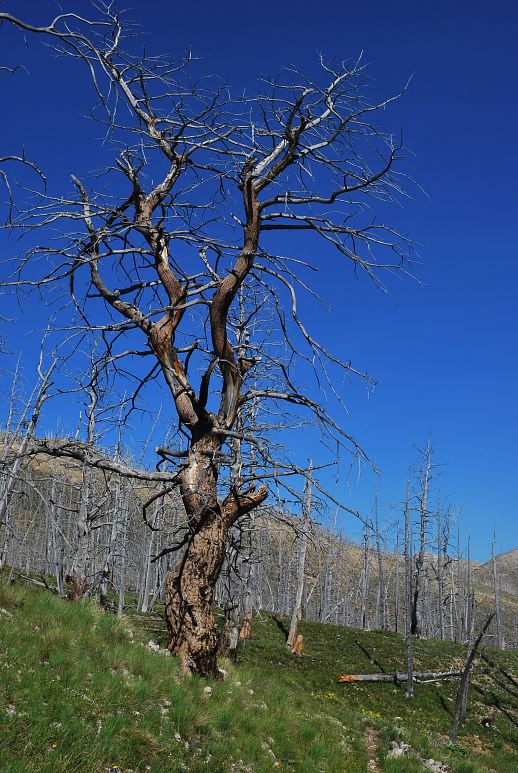
I crossed over Straight Creek pass and because the burned out descent, finally free of logistical worries after twenty five miles of hiking. I realized that an extra mile or two wouldn't make much of difference: I should do it because I truly wanted to, rather than thought I needed to. And with that revelation I was happy and loose, rather than tense and focused. At each step I was doing what I wanted to be doing at the time: Tomorrow I'd have to do the same thing. No reason to worry about it.
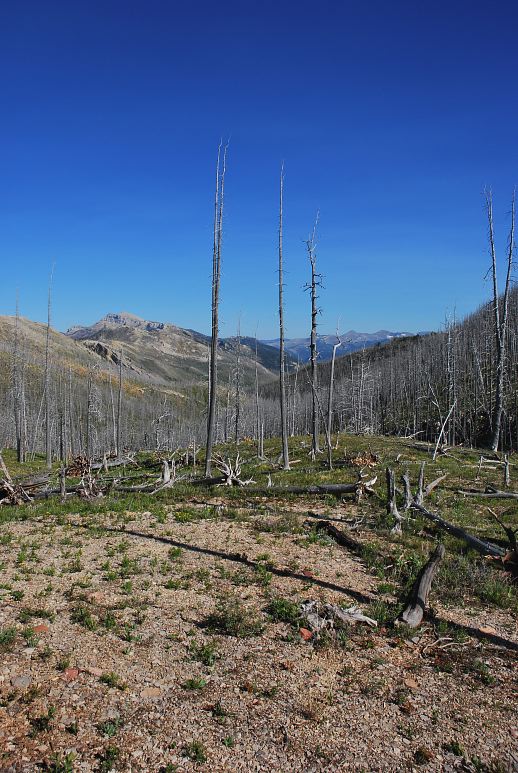
I passed another uninhabited guard station and made my away along the Dearborn to a fine stand of trees that had miraculously escaped the fire. An open, though lumpy, patch of ground formed a nice campsite for the night. I had covered almost thirty miles during the day and I felt it. Tomorrow was one of the great ridge traverses that I have ever hiked. In 2005 it was rainy and nasty and I felt like I was running for my life for most of the traverse. Tomorrow, I hoped would be different. I hoped I'd be able to live and enjoy the exact moment, rather than pondering what to do later on. I wanted to be able to thrive now, rather than torture myself over what might or might not come tomorrow. That is one of the great gifts of long distance hiking.
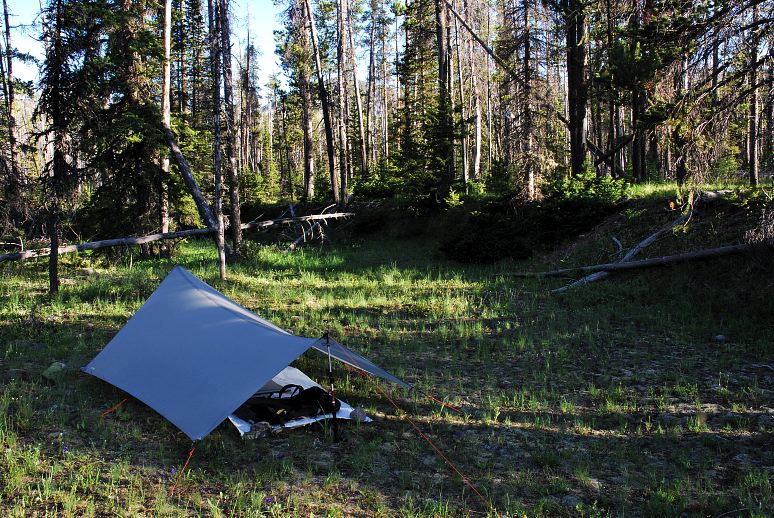
I awoke with a start, her memory strong still in my mind. The girl with pigtails was back. I hadn't seen her in almost a year and a half. But she had come into my dreams in a strange way. It wasn't like a regular dream at all; rather it was the sort of dream that while it is happening feels so real that you can smell things, feel things. The sort of dream that feels so real that when you awake from it you are disoriented because you're no longer where you thought you were. I thought over this as I drank tea and looked over the route for the day.
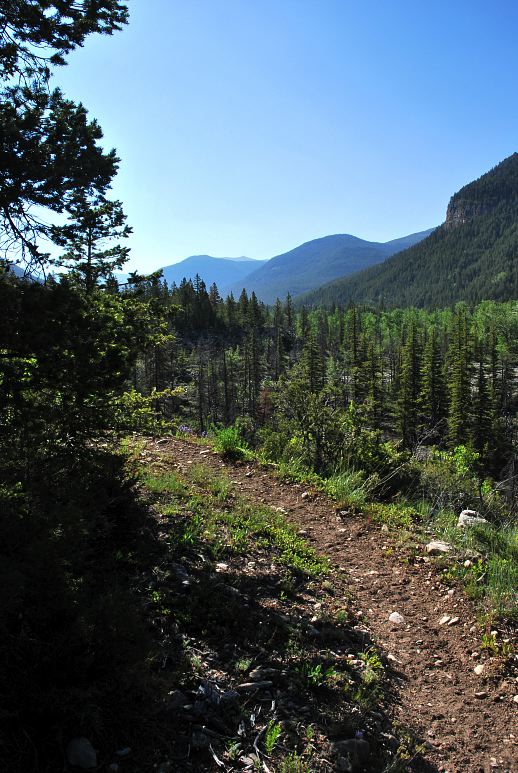
I hiked down the Dearborn thinking of the girl in pigtails. Her pretty blue eyes and mischievous smile. The little cleft in her chin. The dream was lingering on me. I managed to follow the official route, which ended up being just as confusing as the short cut I took last time I was here. And I got lost afterward, unlike the last time, and ended up climbing a steep outfitters trail that eventually fizzled out after a half mile or so. I retreated and found the correct trail, which was pretty obvious after the fact.

I climbed on the correct trail, steadily through the woods thinking still of the girl. Just too young, I thought. It would never work, I thought. Better to stay away, I thought. But when I topped the head of Blacktail Creek and looked out on the world that I would be roaming through, I thought even more strongly of her. She would love to be here and see the expanses of the places that I go, places that I never try to take lightly or for granted. Some day the girl in pigtails will read this, and know that I wrote it after the day of rain, outside on the stairs. There could have been so much.

I loaded up on water and started the open ridge traverse. Though there was no official trail here, many boots had carved a solid path along the route and it was not hard to find the way. What was hard was to make any progress along it, for I seemed to stop and gawk at everything, taking many photographs and thinking about the girl in pigtails.

The hiking was easy, especially as I only had a few days of food on my back and was buoyed by the scenery and the dream. And town tomorrow. The route through the Scapegoat was one of the best that I knew of. A high traverse, with only one place where the route goes down into a valley, it has beauty everywhere, all the time.
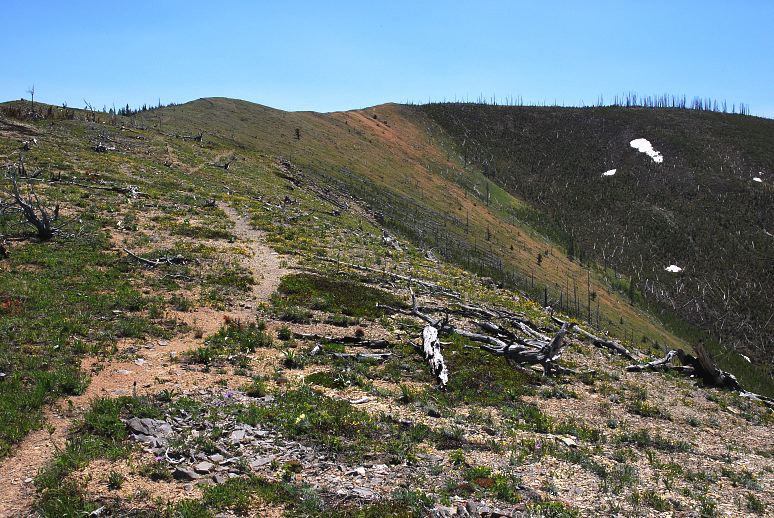
I wandered, enjoying the weather than had escaped me in 2005. The I had been battling a storm and hypothermia for most of the ridge route, getting only a little sunshine later in the day, and then only for a few miles until I was chased down by yet another storm.
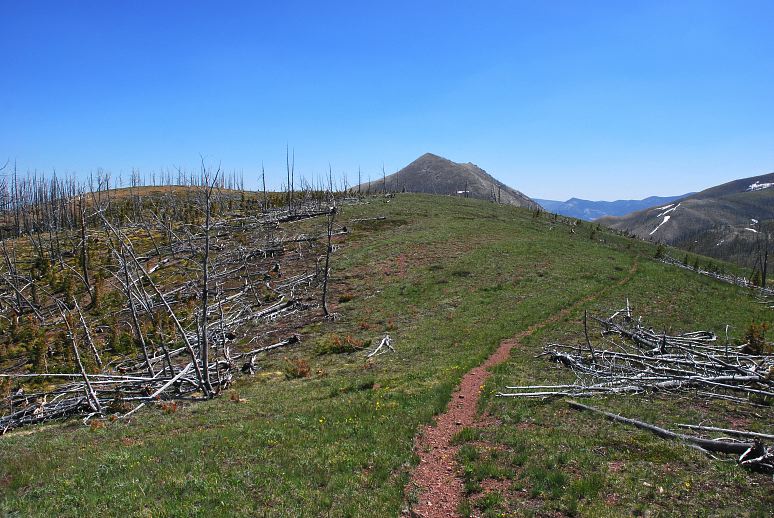
I climbed steeply up a grade and out onto a plateau-pass dotted with the most pale blue wildflowers I'd ever seen. In the photo below you can even see the route ahead: Along the left side of the plateau and then up onto the flank of the prominent mountain, running up and over the shoulder on the far right.

The place was beyond just perfect.

I hiked through the howling wind over the shoulder and gazed down at a large alpine tarn below me. Snow dotted the ridge, but never obscured the true path. How could it?
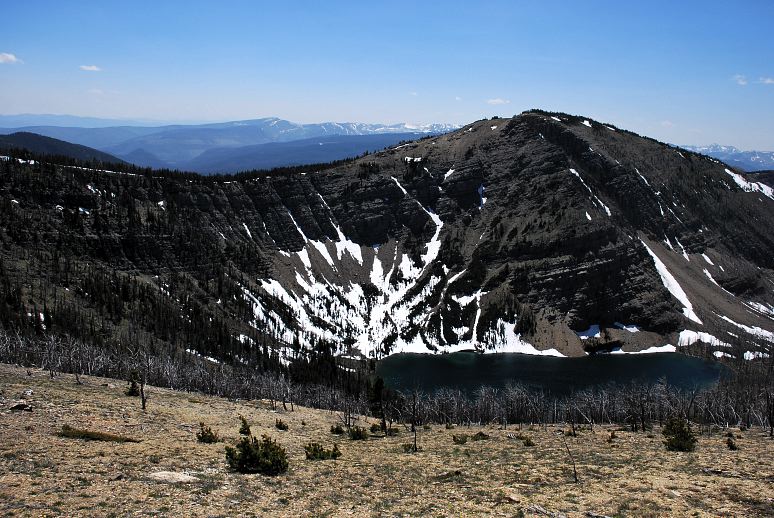
My high route was ending, for the moment. I needed water and a place to eat dinner and fortunately there the Valley of the Moon below me, holding plenty of fresh water for me. The only problem with high routes is that there isn't a lot of water to be had. A small price to pay, I think.
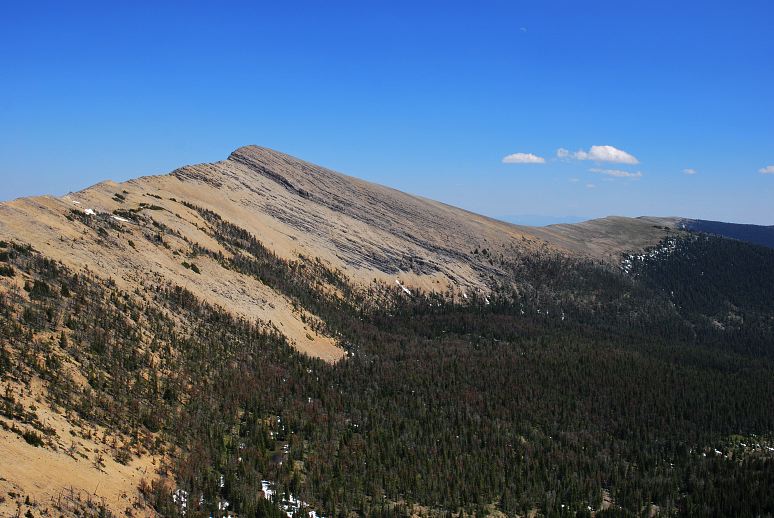
I dropped down into the valley and made my way to a gushing snow melt creek, where I found some dry ground and stopped for dinner, for I wasn't going to haul water just to cook with. I sat there with the dream still in my head. Or rather its fragments, for even the strongest of dreams will fade over time. Writing this, now, I'd like it to fade completely, though I know it never will.
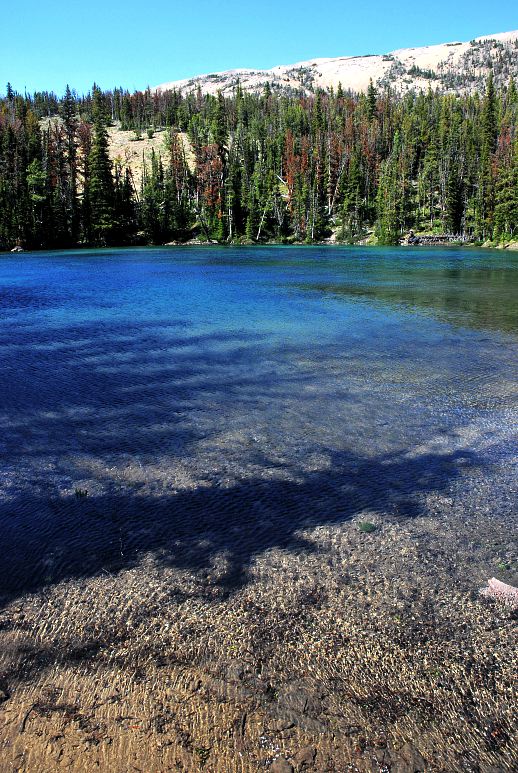
I hiked along the lakeshore and found that I had to actually ford about twenty yards of the lake which, swollen with snowmelt, had spilled over its normal boundaries. A slow hike up through snow got me back into the high country. Back into heaven.
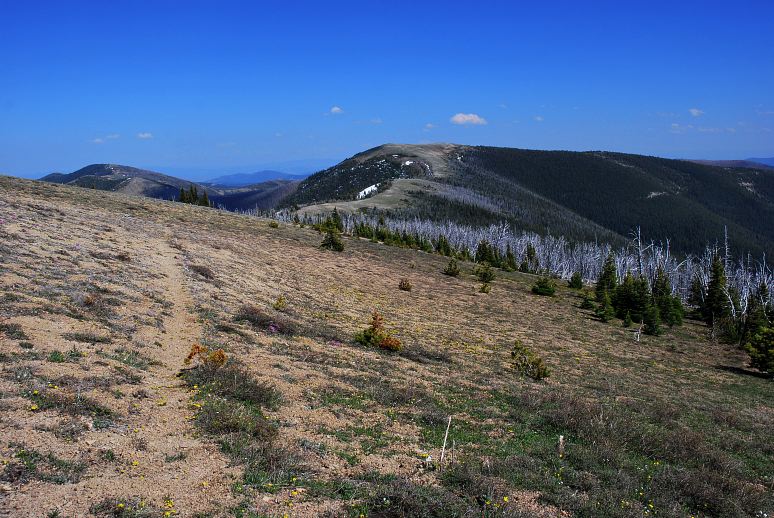
It was hard not to be happy in a place like this, with views stretching for hundreds of miles, lots of sunshine, and plenty of wildflowers gracing my existence with their presence.

A contemplative mood settled in upon me as I walked along the ridge. I began to pull inside myself. Rather, as I write this I feel that pull. I can feel it now, growing inside me and I'm not sure if I should struggle against it or to walk hand in hand with it. Places like the Scapegoat matter for this very reason. They have meaning.
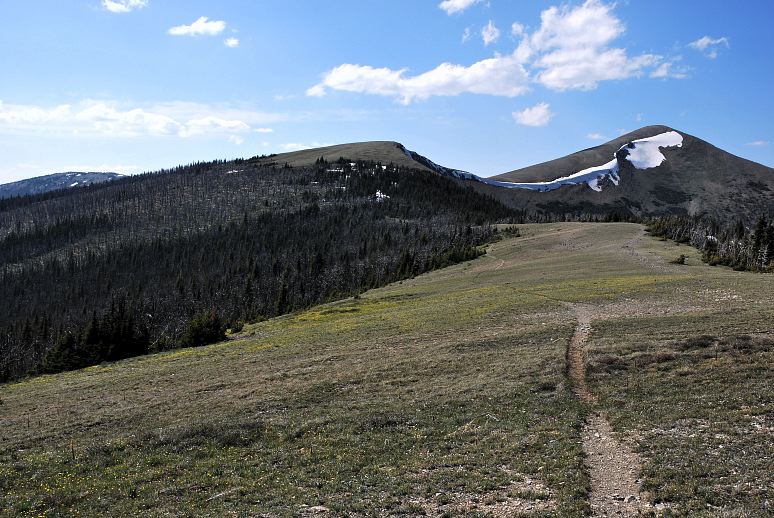
To the east I could see the browning of the land from the rainshadow of the Rockies. A desolate looking place, but one that is appealing for that very reason. I like desolate places. Places like Death Valley, or indeed any desert. The individual becomes amplified there precisely because there is so little there that is alive.
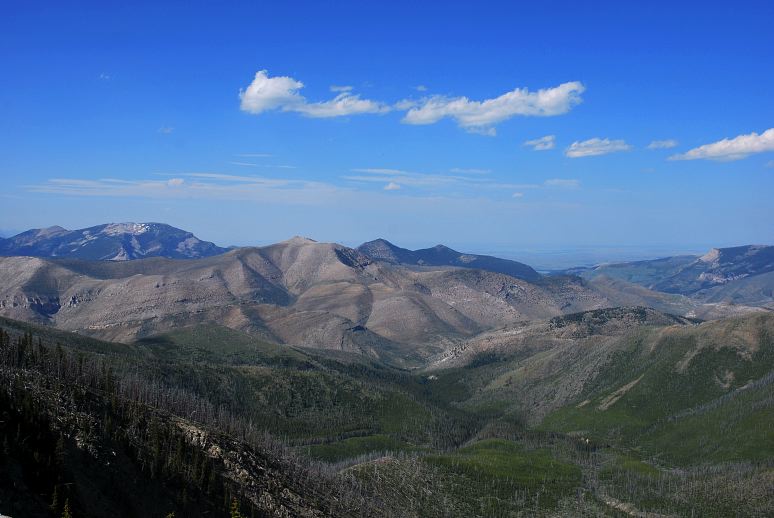
On and on and on the ridge stretched. Beauty piled on top of beauty.

The girl in pigtails probably won't ever come to a place like this, even though in her heart she belongs here. And that is sad. An entire world could have opened up. And not just the Scapegoat, but other places. Wild places. I don't understand why things happened the way that they did. What I do know is that they do not feel right. Something is wrong.
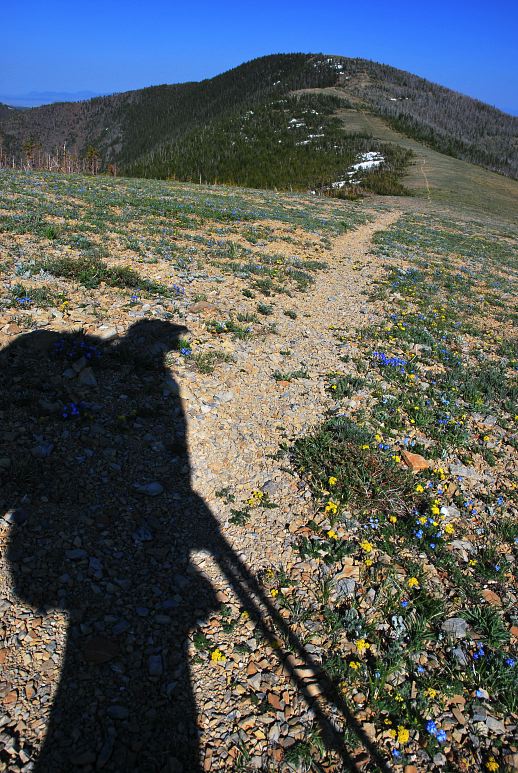
I was out of water and thirsty, with some distance to go before I could drop down to a spring. In front of me lay Lewis and Clark Pass, a place of historical interest to people who enjoy Americana. Lewis came over the pass on his way back from the coast, fleeing an angry party of Blackfeet. He and his men had fought with a small group of them after the Blackfeet attempted to steal a rifle. During the fight two Blackfeet were killed. They're still angry about this today. In the below photo it is the big green pass toward the right side.
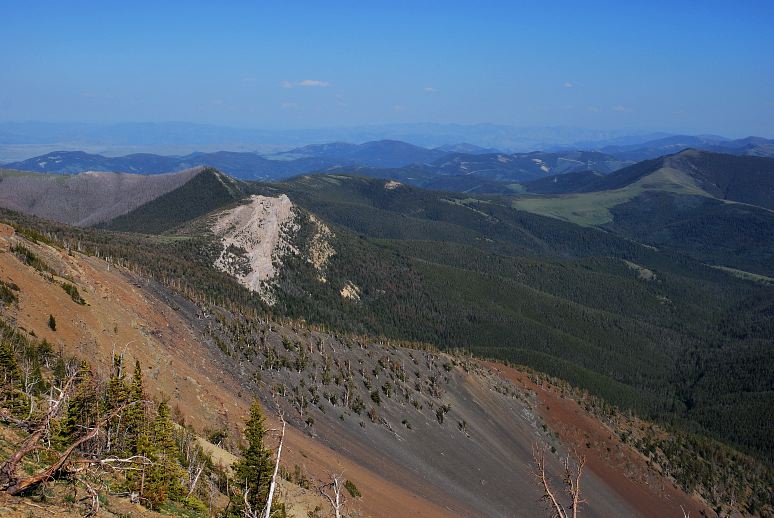
Intuition is a dangerous thing. Thinking with all your being, instead of just your mind, is a dangerous thing. It is dangerous because emotions are misleading, and it is hard to distinguish between emotion and intuition. I could be completely wrong in my intuition, but everything points to one obvious conclusion. My lack of understanding doesn't change that.

It bothers me when I don't understand something fundamental in my life. I know the words, but I don't understand the meaning behind them or where they came from. There is an itch in me that says something is wrong. But I don't seem to be able to bring that out. The world doesn't revolve around me and I'm not all powerful. I'm not the Fonz. Maybe the girl in pig tails will be a part of my life in the future, but I can't see that far right now.
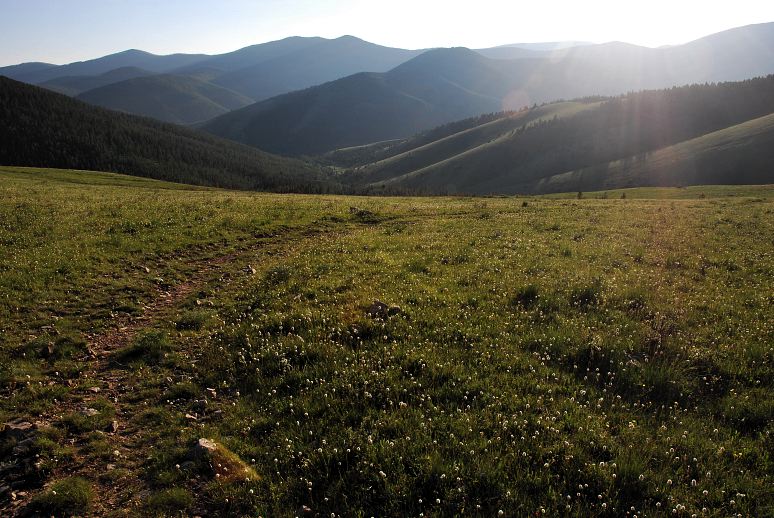
I made it to the pass and looked around at the gorgeous camping possibilities, but without water I couldn't take advantage of them and would have to drop down a bit to a spring marked on my map.
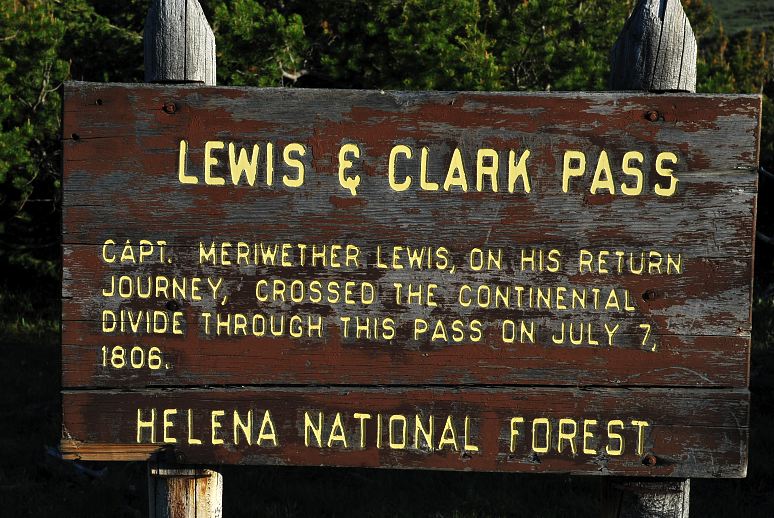
I found the pleasant spring and a lumpy, slightly slanted, place to camp under the stars for the night. I had covered nearly 30 miles again to get to this place. Tomorrow I'd make it to MT 200 and the hitchhike
down to Lincoln. The traverse was nearly over and once I closed my eyes, only the memory would remain.
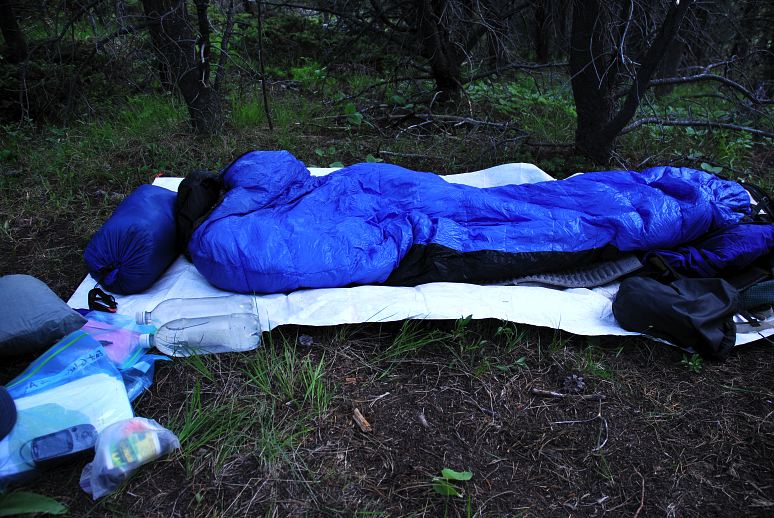
I awoke under my shelter of trees and quickly drank tea and got going. Today was a town day. A not-so-long hike to Rogers Pass and MT200, followed by a hitch down to Lincoln and possibly the end of my hike. I'd have to call home to find out. I was fine not knowing. I was going to enjoy what time I had left.

I returned to Lewis and Clark Pass and started up Green Mountain under gorgeous skies and cool temperatures. I could see hundreds of miles in every direction.

The track continued to be easy to follow as I rambled up and over the various small summits on the ridge route. This was all new terrain for me, as in 2005 I had been forced down to the Alice Creek trailhead, before Lewis and Clark Pass, and hiked out to MT200, then walked all the way in to Lincoln. Not today. Today I was up high and feeling fine.
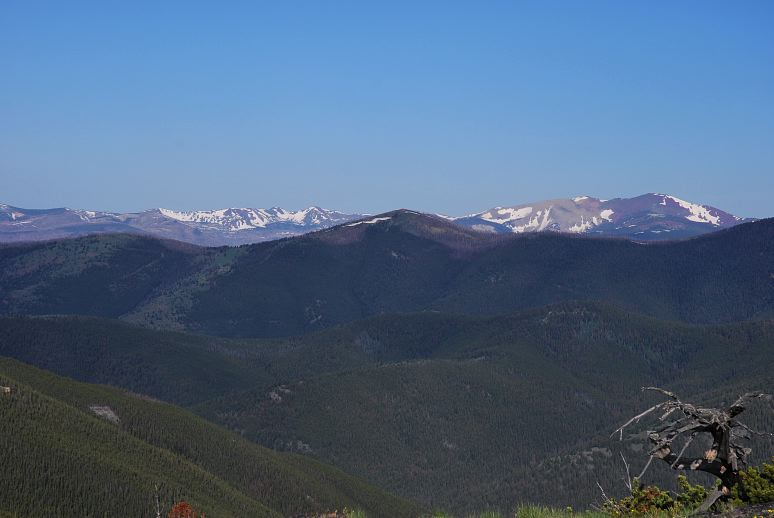
As I approached a subpeak i noticed that there were two tracks carving alongside the flank: A lower and an upper one. I should have paid more attention to my map and took the lower one as it was easy walking and surely the two would meet up eventually. The probability of their being two trails out here was very low and it was clear that this track was a, for the region, major hikerway.
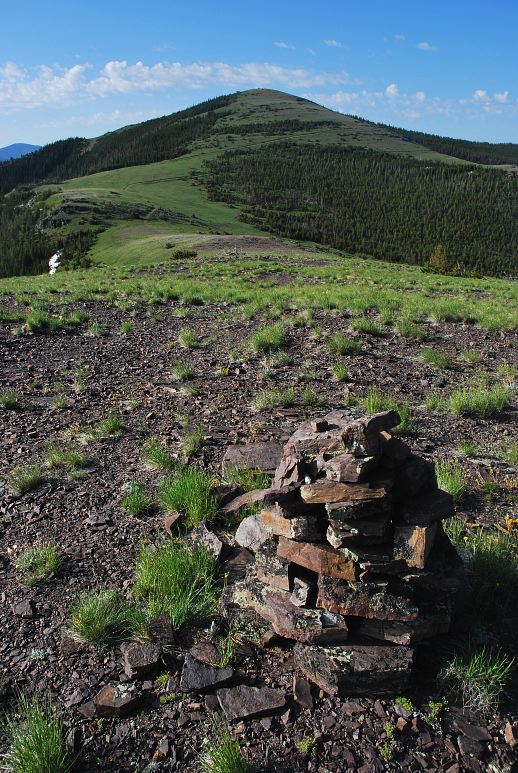
Two hours later I sat on top of a peak looking out at the expanse of land in front of me, well aware that I was no longer anywhere close to the CDT. My track had remained quality for a long time. Occasionally it would fade out, but then it would come back strong. If I had paid any attention to the map I could have corrected course, but now I was too far out. I figured out that I was near the head of Bartlett Creek, and being desperately low on water I needed to find my own way out to MT200. I spied some dirt roads below me, set a compass bearing, and tried to bushwhack a straightline down to the road.
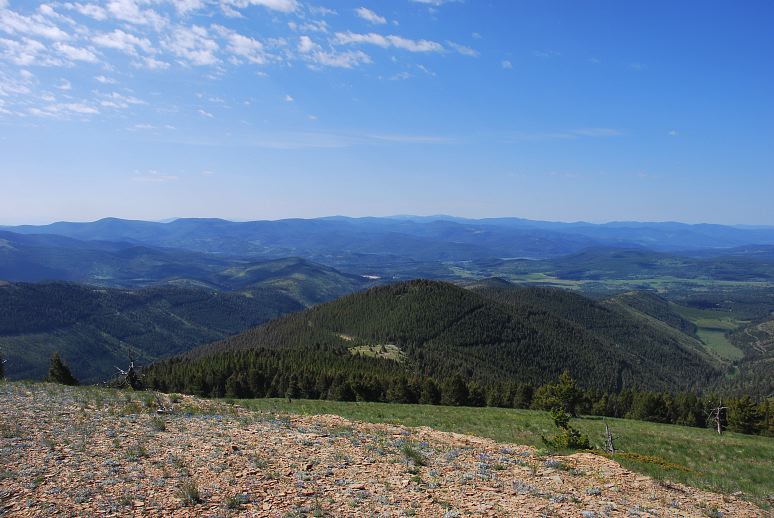
This picture doesn't really fit in with the narrative, but I like the pretty flowers and so I'm putting it in!
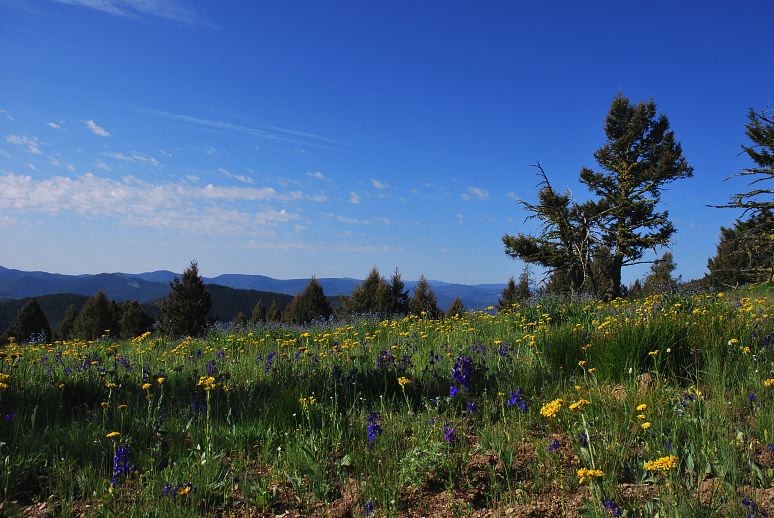
Along the road I hiked, following it in the "down" direction as much as possible, though at times I made poor decisions at junctions and had to bushwhack downhill. Walking casually along, I saw a brown flash in front of me and instantly halted. A mother grizzly was running away from me down the road, with her cub behind her. Then she stopped. Then she turned around. And then she stood on her hind legs to look at me. I paused. Encountering a truly wild animal on its own terrain is a magical moment, at least once the danger is past. The bear was just trying to get a better look at me and wait for her cub to catch up. But that is what my rational brain says now. Then it said nothing. The animal part in me was in control. Reason was dead. The sow and cub eventually left, and I was more careful to make noise.
I found my way down to an abandoned road, but it led me to water, eventually, and from the water eventually out to a ranch, which was clearly a working place, but without workers at the moment. I was happy to get through without a dog encounter and was quite pleased with myself at the highway. At least I was for about ten minutes, when I realized how little traffic there was on the road. I spent an hour trying to hitch, but decided that I should just hoof it into town. Three minutes after setting out, a shiny silver Toyota Corolla stopped on the shoulder in front of me. I couldn't believe it, especially since the driver was Aaron.
I listened to his story of Giardia and hitching and not hitching and travails with sympathy. His hike was more or less ending and he was driving around picking up various mail drops. We rolled into Lincoln and split a room for two nights at the Sportsman motel. The room stunk within 8 seconds of me stripping off my grungy clothes. I had been in the backcountry for rather a long time and relished the comforts of town. Cold beer, a hot shower, and a soft place to sit. I used Aaron's netbook to check my email. And in my account was a note from the girl in pigtails, sent the afternoon before I dreamt about her. And that was how it all started. But that is a story for another place and another time and another audience, for I do not have the strength or the will to tell it here, now, and to you, unless you happen to be the girl in pigtails, in which case you already know how the story started, ran, and ended.













































































